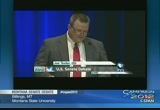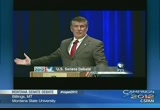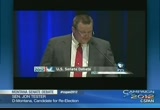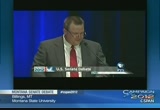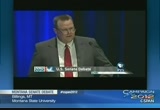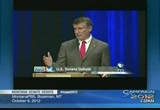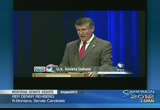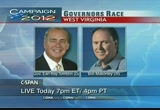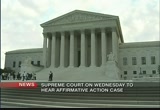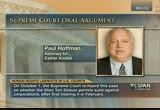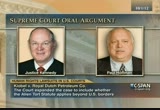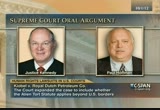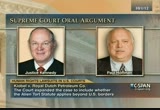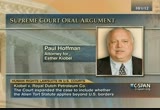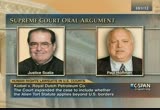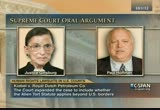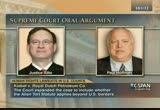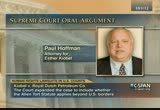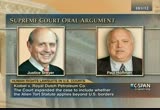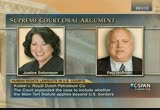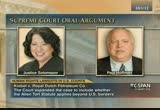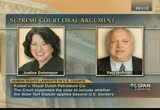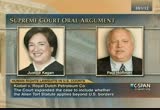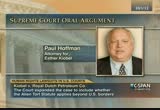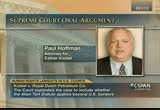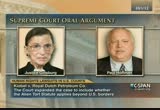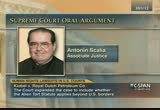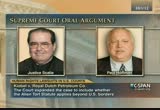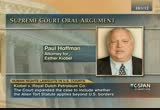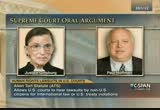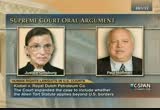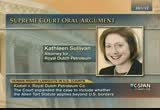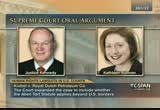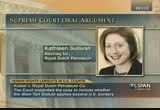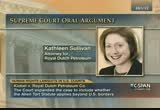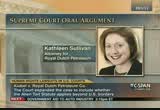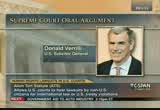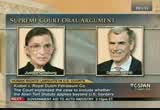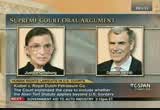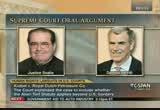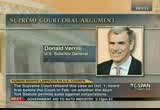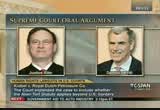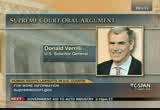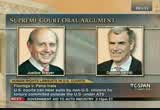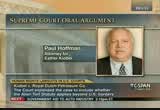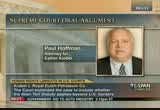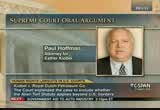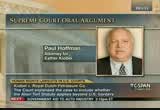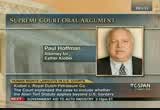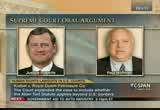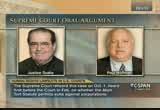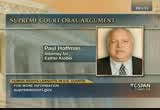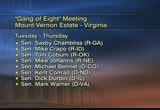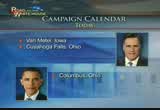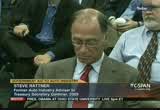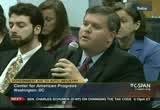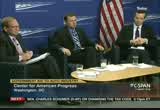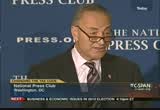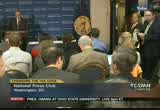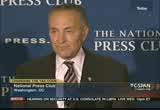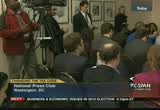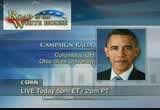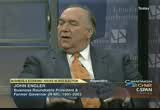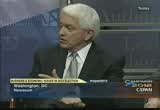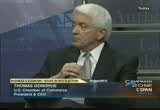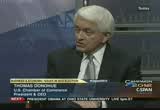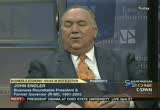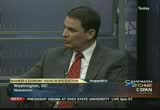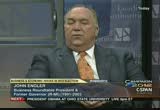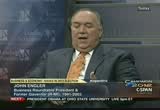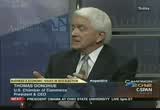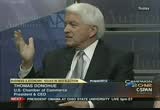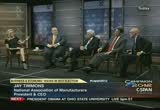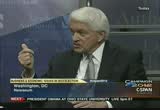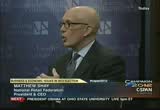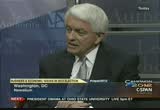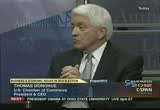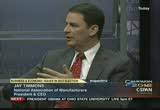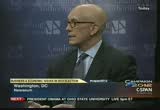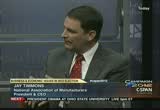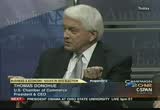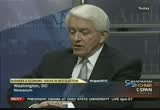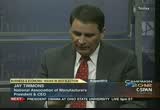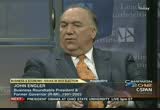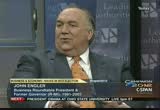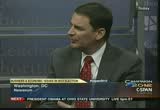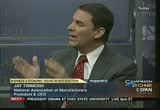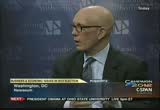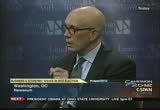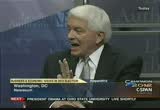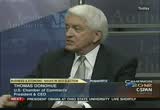tv U.S. House of Representatives CSPAN October 9, 2012 1:00pm-4:59pm EDT
1:00 pm
this country and we're setting up creating two new entitlements for the president's healthcare reform? does that make any common sense that you will create two new entitlements? >> now a question from mike dennisson. >> senator tester you strongly send conservation group. congressman rehberg you strongly supported by oil and gas. >> if you take a look at the xl >> now question from my attendance and to senator tester. >> for borders looking at the contrast, why should they vote for you? >> because i dst, they vote for you? >> because i do not i ask them how high to jump and jump. if you look at the conservation are buying, there are a lot of groups out there that do not want to see the pipeline built. i want to see the pipeline
1:01 pm
built. there needs to be a record -- a level of regulation out there, but it cannot be crazy. we need a certain -- we need to insert a little montana common sense into that going forward. got othermes i've entities, because we have to do what is right for montana in this country and that is exactly what i do. my record is proven on that. we did it because it was the right thing to do. >> the number one recipients -- recipient of lobbyists are wall street money. yes, i am supported by gas and coal industry. who produces more jobs in the state of montana, the oil and gas industry or wall street? the oil and gas industry. they clearly support because they know that if we're going to
1:02 pm
build a future for montana and paid for education and other services, it comes out of the coal field -- the coal mines and oil fields. the question becomes, is there a balance? i am a rancher by trade and i clearly understand you need economic development, but also conservation. my favorite book is holistic resource management buy out unsavory. -- by allan savory. there'll be areas where you want to protect the wildlife, but there are areas where you need to make a living. that is where sometimes the extreme environmentalists do not understand that those of us in montana need to make a living. i will stand with those counties that will try to produce the jobs for those industries. >> i did not bail wall street out and i put cops on the
1:03 pm
beat to deal with industry that you did not square with, by the way. you can say what you want, but it does not meet the test of truthfulness. when a driver everything, agriculture, oil and gas, natural resources -- we need a little bit of everything, and agriculture, oil and gas, natural resources. our recreation economy is $3 billion a year in this state to make sure we have opportunities for recreation out there. do not tell me it can be just one industry. it has to be a bunch of industries out there. >> thank you. we have run out of time for questions. and we will give each candidate to minutes for closing statements about their campaign to be montana's representatives in the u.s. senate. senator tester will go first, followed by rep river.
1:04 pm
>> i want to thank everybody in the audience and on the panel and everyone who is listening tonight. how many people in this audience are from the silly -- the city of billings. raise your hand. thank you very much. congressman rewhberg is suing each and everyone of you. i have talked about montana and people working together. the first thing you do when you've got a grass fire, the firefighters put it out and they put their but on their line and you do not respond and say thank you by filing a lawsuit, which is exactly what he did. that is not moving the committee forward. it has been a pleasure for the last six years to represent the great state of montana. people like thomas, who is a veteran in afghanistan and is still a part of active military. he lost part of his legs and an
1:05 pm
arm. he will have prosthetic legs at some point. to be able to move forward, those people give me a drive for this job. a person like lisa jones, who is a cancer survivor. she went to a committee health center that would not have been there if the congress men had gotten his way. she got a cure for cancer. critically important for early screening. and those kinds of people motivate me. and we have been able to work across party lines and do some great things in the past few years there are far more things to do. there are issues with -- all of these issues are critically important as we move forward. he will vote on a member sixth, and i will never be in here does. -- you will vote on november 6, and i hope everyone in the ordaz. >> it has been -- i appreciate
1:06 pm
the opportunity to represent you in montana. i have trouble all around and nobody has brought up the fire except for you. they talk about the irresponsible decision making that goes with supporting president obama 95% of the time, on things like obamacare and on the stimulus. the monetary loss is the loss of the correct plant when you lose 35 jobs when it shuts down. you lose jobs let schools and at local government. that is the real cost of what his policies are bringing out by supporting bureaucrats in washington. one neighbor at a time, you've got two avenues to take. one is a government solution of believes government can bring you a job. and me, who believes we can revitalize and reenergize and
1:07 pm
renew the enthusiasm for montana if we can get government out of the way in our regulatory policy and in our industries. it is not just the businesses that will turn things around. it is those who will -- to work for those businesses who will help to create better opportunities for ourselves, our children, our businesses. i look people in the eye as i travel a run montana and i do not see statistics. we do not necessarily want to talk about the unemployment rate statewide. there are 56 counties with 56 cultures and histories and their own desire for their own future. and in liberty county and might be agriculture. in lincoln county might be timber. in eastern montana it might be oil and gas and coal. i want to get government out of the way. i want to give people the same opportunities that we had and that our parents had. will your children have the same
1:08 pm
opportunities? i want to return that enthusiasm to america, to montana, to build a more security -- more secure future for the people of montana [applause] >> that wraps up tonight's forum. many thanks to the candidates for stepping forward to offer their leadership skills. good night. [captioning performed by national captioning institute] [captions copyright national cable satellite corp. 2012] >> election day is four weeks away and c-span continues to bring you live house and senate debate coverage. tonight, our campaign 2012 coverage comes from virginia in charleston, a debate between the state's governor, earl ray tomblin, and his republican challenger tom mahoney. mr. tomblin won a seat in a
1:09 pm
special action against mr. mahoney. that then followed joe manchin's election to the senate. the registration deadline is today. president obama will be speaking to students at ohio state. we will have that live at 5:00 p.m. >> look what obama did on the budget, nothing except at borrow and spend. and as a result of his abdication of leadership, as a result of seeing the most predictable economic crisis in our country's history and not fixing it, our credit rating was downgraded for the first time in our history. >> we laid out a $4 trillion debt reduction plan over the next 10 years. and we are already passed $1 trillion of it. ladies and gentlemen, these guys vote against everything. no, i really mean it. ok, i get that you do not like our plan. and what is your plan?
1:10 pm
>> paul ryan and vice-president joe biden will face off in a vice presidential debate. you can watch engage with c-span with our live debate preview starting at 7:00 p.m. eastern followed by the debate at 9:00 p.m. your reactions and calls and tweet at 10:30 p.m. follow online at c-span.org. >> the supreme court tomorrow is scheduled to hear oral argument in a case dealing with whether to admit the traditional preferences. a texan who has since graduated from the louisiana state univ. student university of texas austin saying that she was subject to unequal treatment. a supreme court justices will rule on the system of racial preferences. justice kagan will recused herself because of her
1:11 pm
involvement with the case as solicitor general. nine years ago, they ruled 5 to 4 to uphold the university of michigan law schools limited use of affirmative action. and coming up next on c-span, oral arguments from last week's opening session of the courts full term. this case asks whether courts have jurisdiction to hear lawsuits and forge human rights abuses that occurred out -- for human rights abuses that occurred outside the country. this is an hour. >> we'll hear argument first this term in case 10-1491, kiobel v. royal dutch petroleum. mr. hoffman? >> mr. chief justice, and may it please the court,
1:12 pm
the plaintiffs in this case received asylum in the united states because of the human rights violations alleged in the complaint. they sued the defendants for their role in these human rights violations in u.s. general personal jurisdiction of our courts. abouts nothing unusual suing a tortfeasor in our -- >> may i ask you about the statement you just made? personal jurisdiction was raised as a defense, right? >> personal jurisdiction was raised as an affirmative defense, but not raised in a motion to dismiss. >> and so your position is it was waived? >> yes. >> but it was not adjudicated. is there -- >> it was not adjudicated in this case. our position, it was waived when it was not raised in a rule 12 motion. >> what effects that commenced in the united states or that
1:13 pm
are closely related to the united states exist between what happened here and what happened in nigeria? >> the only connection between the events in nigeria and the united states is that the plaintiffs are now living in the united states and have asylum because of those events, and the defendants are here. there's no other connection between the events that took place in the -- in nigeria and the forum. the basis for suing the defendants here was because they are here and because it was possible to get jurisdiction. >> and just to make it clear -- >> yes. >> it's your position -- and i believe it's the position of the united states, i'm not sure -- that if a u.s. corporation commits an international law violation in the united states, that u.s. corporation can be
1:14 pm
sued in any court in the world? >> well, it is -- it is possible that other countries would assert jurisdiction. i think that, generally speaking -- and it might well have been the case in this case had the issues been raised -- most of the time, alternative doctrines like the requirement of personal jurisdiction, or the requirement -- or forum non conveniens or other doctrines would -- would have those cases litigated in other places. >> but then -- but the way i stated the hypothetical, or the proposition, that is your beginning proposition -- although there might be some defenses. but as a beginning matter, that they can be sued in any country in any court in the world. >> well, i think it would depend on what the events were and what the claims were and -and what the law in that jurisdiction was. >> well, we assume -- >> i think that this -- sorry. >> we assume a violation of international law -- >> ok. >> as part of the hypothetical. >> yeah.
1:15 pm
well, i think that if -- if, in fact, the u.s. corporation committed a violation of the universal jurisdiction norm, for example, as we believe these norms are in this case, there are many jurisdictions in which u.s. corporations could be -- could be sued. in fact, in the united kingdom and the netherlands, i believe their -- their provisions criminal court might -- kfa>> i suppose, if you have --i suppose, if you have, as i think there probably is in this case, a number of plaintiffs, they can sue in a number of different countries, right? some will sue in the united states, others in the united kingdom, others in the netherlands? >> well, it -- it is possible that the plaintiffs could have sued in other places. they sued here because this is where they live. this is their adopted homeland because of that. the united states, under
1:16 pm
international law, clearly has jurisdiction to adjudicate claims between parties properly before them. >> is there some -- is there some super body that decides what constitutes a violation of the particular norms of international law? that is to say, these other countries that have jurisdiction, they decide for themselves, don't they, what -- whether there's been a violation of the international norm or not? >> well, if -- if there are proceedings with respect to those norms or violations, yes, they do. and then in domestic courts, there are international tribunals that have a limited jurisdiction, and they decide. there are some ad hoc tribunals that decide other cases. and the national -national courts have always been engines of decision making on -- on international law. in fact, that's the foundation of this -- of this statute comes from the founders' desire to have federal courts decide what law of nations claims -- >> sure, national courts have been the deciders when -- when the violation occurs within the nation.
1:17 pm
but to give national courts elsewhere the power to determine whether a united states corporation in the united states has violated a norm of international law is something else, it seems to me. >> well, it's unlikely that - that that would come up, because the suit could be brought in the united states. it's also unlikely, because, based on most forum non conveniens doctrines, the suit would be heard here, because -- >> you didn't mention exhaustion of administrative remedies. >> well, there is the possibility of exhaustion of local remedies. i know the european union brief suggests that that's part of the international law package that one has to accept. and this court in sosa did say that it would consider an exhaustion of local remedies doctrine if that was the case. and, of course, exhaustion of local remedies would be an
1:18 pm
additional safeguard against the issue that justice kennedy and justice -- >> suppose a case like this is brought in the united states and the state department tells the district court that allowing this case to go forward will have a very deleterious effect on u.s. foreign policy and on the welfare of u.s. citizens abroad. >> well, i think there -- >> the district court says, "well, there's nothing i can do about it. this case is just going to forward." that's your position? >> well, no, not at all. i mean, i think -- >> well, what would happen in that situation? >> well, i think the political question doctrine would clearly apply, and -- and -- and a court would decide whether to go forward. if the united states believed that the case should be dismissed, as i understand the u.s. position in past cases like doe v. exxon, is that there should be interlocutory appeal from -- from a denial of a political question doctrine decision to go forward in light of that.
1:19 pm
>> what if a district court won't certify a question for interlocutory appeal? >> well, but i think what the u.s. position is, and i think -- i think it would -- i assume it would be accepted -- is that if the united states says going forward at all raises those questions, that it would be able to go up on a cohen v. -- >> well, you know, justice alito can protect his own hypothetical, but it seems to me you're walking away from it. the question as i understood it assumed that there is a violation of international law. >> right. >> but that proceeding with this particular case will, because of some other reasons -- >> right -- >> involve the united states or its citizens living abroad in serious complications with a foreign government. that's not a political question. >> well, it could be. >> there's political consequences, but that's the whole point. >> well -- >> there's -- there's -- you can't cite a case -- but maybe you can, please do if you can -- that this is part of the political question doctrine. >> well, i think that in corrie v. caterpillar, for example, there were alleged human rights violations, and the united
1:20 pm
states said that because u.s. aid was involved in providing the bulldozers that were involved in that alleged human rights violation, that the court should dismiss on political question grounds, and the courts did dismiss on political question grounds. >> couldn't you just say if - would we have the power to say, looking at sosa and the principles that narrow considerably the subject matter of this statute, to add a requirement that if the state department says that it interferes with foreign relations it doesn't fall within the statute, can't bring it? >> well -- >> that would get rid of this problem, wouldn't it? >> well, that would get rid of the problem. i think that in truth, the way the political question doctrine would work would probably end up being the same when it's that kind of rule. >> it would be the same thing. by the way, did we sign the torture treaty? >> yes. we've ratified -- >> we've signed the torture treaty. >> we've ratified -- >> the torture treaty does provide for -- for what is it called, universal jurisdiction? >> yes. >> all right.
1:21 pm
so, if in fact a corporation in the united states, in cahoots with the government or something, should do the unusual thing of violating the torture treaty, tasmania or any country in the world that signed the torture treaty would have jurisdiction under that treaty to proceed, is that right? >> right. >> so the situation that we're talking about already is in existence. >> that's right. i mean, there's nothing that the court would do in this case that would change -- >> well, if it was the corporation, it wouldn't fall under the torture -- >> well, that -- no, the torture treaty says nothing about corporations. >> right. i mean, that's different from the icc. but the -- yes. >> counsel, there is the amicus brief from the european commission. >> yes. >> and it provides for a very simple rule. please explain to me what's wrong with it? it basically says you have to borrow both the substantive and procedural international law
1:22 pm
norms, that those norms do permit these foreign- cubed cases only so long as either, it appears to me, the defendant is a citizen of the country, the acts occurred within that country, or the alien has exhausted both domestic and international avenues for relief, a sort of forum by necessity, which apparently most countries have, including the ones who have submitted amici arguing -- >> right. >> different points, like england and the netherlands. >> right. >> it seems to me like a fairly simple set of rules clearly defined and limiting the application of this statute in a way that sort of makes sense. >> well, i think -- >> what's wrong with the rule? >> i don't think there is a lot wrong with the rule, actually.
1:23 pm
in a foreign cube kind of case, it seems to me the eu position is, number one, that there is universal jurisdiction no matter whether you consider the federal commonwealth cause of action prescriptive or not. and so, the countries of the world have agreed that all states have an interest in enforcing these fundamental norms and that's part of international law. and that -- that what goes with that are limits of exhaustion of remedies under international law, which safeguards the interests of third states before the united states can litigate it. >> so answer me why is this not the case where on the facts there has been a failure to exhaust. >> well, i think that we would - we would -- there's no record, obviously, about that. and one of the arguments we would make about exhaustion, i believe, is that it would have been futile to exhaust under international law -- under international law standards.
1:24 pm
>> might be -- nigeria is one question, but other potential forums are the u.k. and the netherlands. >> right. and i think that we -you know, we have -- if there was an exhaustion of local remedies requirement, then we would have to see if we could satisfy that. >> i think -- haven't both of those nations said they would not entertain this case? >> it's not clear. i mean, in fact, the -- you know, there is a recent dutch decision that goes perhaps farther than the alien tort statute, the al brujaj case. >> but you would agree, mr. hoffman, that if there were an exhaustion requirement, it would not apply only to nigeria, but also to the netherlands and to the u.k. >> well, i mean, it depends on how the court frames it. i mean, there's the exhaustion requirement under the torture victim protection act, there are arguments about what that looks like under international law.
1:25 pm
i mean, i think that -- to follow up on justice sotomayor's point, i think that if that's deemed by the court to be a requirement of international law, then international law rules on exhaustion should apply, and we would either be able to satisfy them or not or take whatever position we would take with respect to that. >> well, the u.k. and the netherlands, i -- well, i'll ask you. do you disagree that those are fair judicial systems where a plaintiff can get a fair shake? no, i don't think that anybody disputes that the legal systems in the netherlands or the united kingdom are fair. i mean, they obviously are. >> well, if that's so, then what does this case -- why does this case belong in the courts of the united states -- >> well -- >> when it has nothing to do with the united states other than the fact that a subsidiary of the defendant has a big operation here? >> well, it -- it -- from our standpoint it's here, the way i started the argument, really, which is that our clients are here, they're here. personal jurisdiction has not
1:26 pm
been contested and no one made a forum non conveniens motion in this particular case. now, there was a forum non conveniens motion in a companion case. so -- but i think that that's a problem that goes more toward -- >> and what happened to that? >> it -- the second circuit overturned the district court on forum non conveniens. >> overturned it which way? >> it said that the case -- thatthe wiwa case could proceed and -- >> so it rejected the forum non conveniens. >> rejected forum non conveniens in that case. and i know that the united states brief believes that that was wrongly decided. but from our standpoint, if we're talking about the way that the ats should be structured, our belief is that forum non conveniens, generally speaking, is going to deal with the problem -- the problems that the court has raised. if -- if the court believes
1:27 pm
that the wiwa decision was wrong or that that doctrine's wrong, that doctrine should be changed. >> may i ask you a question about your reliance on the alien tort statute, that if your theory is that this is a violation of a universal norm, and that federal common law makes it a claim available in the united states, now there is 1331 general federal question jurisdiction. couldn't you have said, never mind the alien tort statute, i'm suing under 1331 federal question jurisdiction, and i have got -- the claim for relief is the u.s. common law implementing the international law? >> well, i think this court in sosa said that its analysis did not necessarily apply to 1331,
1:28 pm
and i think that's because of the history of 1350. the history of 1350, as the historians' brief lays out, is that the founders believed that certain law of nations norms could be implemented by common law tort actions. and this court in sosa found that without further congressional action, the courts of the united states would be available to enforce norms that were similar to those norms. and in fact, the norms that the founders were familiar with were very similar in kind to the universal jurisdiction norms that justice sotomayor -- >> yes, but general -- general common law was not considered to be federal law, neither federal law nor state law. if that were so, every tort action, which in those days were decided under -- under a general law that was up there in the sky, would have been a federal -- a federal claim.
1:29 pm
>> but there were -- there was certain -- there were certain norms that were believed to be part of the law of nations, including piracy and attacks on ambassadors, and they were governed by universal standards. >> common law. it's general common law. >> well, but i think this court found in sosa that that -- that that part of common law at the time has become customary international law, and that the courts of this country have not lost their ability to enforce the same kinds of law of nations norms as the founders wanted to enforce in the alien tort statute in the context of universal human rights norms. >> well, that isn't the issue. the issue is whether when they do so they are enforcing federal law or not. >> i think this court said that the federal common law within one of the exceptions to erie -- i think this court, right after erie, found that there were enclaves of federal law,
1:30 pm
one of them being the area of foreign relations, where federal common law should be viewed as federal -- >> well, that answer would apply if you were answering justice ginsburg's question in the affirmative by saying that there is 1331 jurisdiction, but you need not go so far, given sosa. >> we don't. we don't, and i think the distinction is that in sosa and in the alien tort statute the statute itself speaks about torts. this court found, based on the history and intent of the congress, that there was no reason to wait for any congressional authorization to go forward on those claims, and therefore it was available to bring claims. so -- >> well, maybe they had -- >> we're not taking the position that 1331 -- >> maybe they had to provide that in 1789 because there was no -- there was no general federal question jurisdiction existing at the time.
1:31 pm
>> well, it could be, but what seems more obvious about the reason for the alien tort statute was to make sure that there was a federal court available to litigate law of nations claims that could have been litigated in state court, just as these claims could be litigated in state court. and in fact, one of the -- and, also, in answer to the respondents' claims about extraterritoriality, if one imagines -- under the respondents' theory, you could -- a french ambassador could be attacked by a frenchman in pennsylvania and have alien tort statute jurisdiction and a claim for relief. if a u.s. citizen attacked the french ambassador on foreign soil, he wouldn't have an alien tort statute claim, he would be sent to the state courts if he could -- the state courts were open, which is exactly the opposite of the purpose of the alien tort statute, the fundamental known purpose of the alien tort statute. >> you point out, i think, an anomaly.
1:32 pm
if the victim is a united states citizen -you say the only ties here are that the victims got asylum in the united states, so they are here. but someone who is here all the time, someone who is a citizen of the united states, but is abroad and is a victim of one of these atrocities, there would be no suit for such a person. >> well, congress provided for some jurisdiction in the torture victim protection act. >> yes, but under the alien tort statute. >> well, the alien tort statute is limited to alien plaintiffs. i mean, and that was the congressional design, and it was -- that arises out of the history, to make sure that aliens with law of nations claims had access to federal courts and federal remedies to vindicate those positions.
1:33 pm
the united states could still take action to protect the u.s. citizen. can i reserve the balance of my time then? >> you can. ms. sullivan? >> mr. chief justice, and may it please the court, this case has nothing to do with the united states. it's nigerian plaintiffs suing an english and dutch company for activity alleged to have aided and abetted the nigerian government for conduct taking place entirely within nigeria. and, justice ginsburg, to the personal jurisdiction question, shell did not waive personal jurisdiction objections to the suit. the court in the companion wiwa case determined -- rejected the personal jurisdiction affirmative defense, and the second circuit affirmed. so if you look at joint appendix pages 111 to 112, you'll see that we absolutely preserved the personal jurisdiction defense. missing from the discussion you've just had with mr. hoffman about possible ways to minimize the dangers of applying the ats in foreign countries is any mention of congress. and i'd like to return us to the
1:34 pm
question presented on this round of the argument, which is, should the ats and, justice ginsburg, federal common law be applied to conduct taking place entirely within the borders of a foreign country? and our answer is it should not, under the -- >> does that mean, ms. sullivan, that you -- and do i understand your argument on brief correctly, that you would say from -the revival of 1350 from filartiga was wrong because nothing happened -- nothing happened in the united states there? marcos was wrong because nothing -- the wrong occurred abroad? does your -- the argument you're making now that this is not applicable to things that happened offshore exclude filartiga and marcos? >> we do not believe that you need to address filartiga because filartiga is taken care
1:35 pm
of entirely by the proper body, which is congress. congress, in enacting the tvpa, the torture victim protection act, covered a situation like filartiga, where a paraguayan plaintiff sues a paraguayan individual defendant for conduct in paraguay. >> but then you're at least saying -- >> well, maybe it's just history and background, but i would really like you to answer justice ginsburg's question. suppose we had granted cert in filartiga before congress acted? what -- under your position, what should have been the result? i think that was the purport of her question, and i would appreciate an answer to it. >> yes, justice kennedy. we think the current correct result is that the ats and federal common law, which is substantive and remedial law of the united states -- and here, we agree with the united states on page 2 of its brief -- ats plus federal common law is the substantive and remedial law of the united states. and we think, under the well- established canon against extraterritorial application of u.s. law, absent congressional clear indication, there should not be such an extension. therefore -- >> ms. sullivan, can i ask you
1:36 pm
about your position on extraterritorial application. believe strongly in the presumption against extraterritorial application, but do you know of any other area where extraterritorial application only means application on the territory of a foreign country and not application on the high seas? >> well -- >> i find that -- you know, extraterritorial means extraterritorial, but -- but you contend that this -- as i think you must -- that this statute applies on the high seas.
1:37 pm
>> we -- we don't concede that seas. >> oh, you don't? ok. i thought that was common ground. i'm glad to know it isn't. >> sosa said, looking to the three blackstone paradigms, assault on ambassadors, and piracy, that certainly the antecedents to the ats, the morbois incident of an attack in philadelphia, and the new york constable entering the home in new york city of the dutch ambassador, those were incidents on u.s. soil. >> we -- we don't concedeand soe third paradigm, piracy, might also be covered. >> well, i thought that was the most clear violation of an international norm. the one thing that the civilized countries would agree on is that you -- >> at the time. >> capture pirates. >> our clear -- our position on piracy is this. even if you think the ats and federal common law can extend to conduct on the high seas, which are stateless, a place where no foreign sovereign rules, that does not mean that the ats and federal common law can apply to conduct within a foreign sovereign's borders -- >> well, it doesn't mean that. it doesn't mean that, but if the -- what is the question we're asking. if, when the statute was passed, it applied to pirates, the question to me is who are today's pirates. and if hitler isn't a pirate, who is? and if, in fact, an equivalent
1:38 pm
torturer or dictator who wants to destroy an entire race in his own country is not the equivalent of today's pirate, who is? and we have treaties that say there is universal jurisdiction. other countries take it. >> justice breyer -- >> we took it in filartiga. we took it in the cases that justice ginsburg mentioned. so i absolutely grant you could make the distinction, but, given the purpose and an objective of the statute, why should we make it? >> justice breyer, with respect, the united states has not acceded to the principle of universal civil jurisdiction. and with respect -- >> well, we did explicitly in the torture treaty in respect to that particular incident. >> justice breyer, in our brief at 48, note 11, you'll see that that's not quite the case. i'm sorry -- i'm sorry. we object -- the united states objected to the universal civil jurisdiction aspect of the convention against torture. we have never acceded to that.
1:39 pm
and the reason is that we fear exactly the consequences justice kennedy began the argument with. we fear that if we say that a united states court can be open to try any accused law of nations violator anywhere in the world regardless of the place of the conduct, the other nations of the world might seek to do the same to us. >> they do that, don't they, with torture? right. does that make it better? >> criminal is very different from civil. and what we -- the precise argument we are making here is that the presumption against application of u.s. law to conduct within foreign sovereigns -- and remember, the purpose of the presumption, justice scalia, is to avoid conflict with foreign sovereigns. there is no foreign sovereign over the high seas. the conflict arises, and the presumption protects against this conflict, when we go into a foreign nation, we project our law. >> i understand that. that's the worst. but i really don't -- you appeal to the general principle of
1:40 pm
territoriality of our laws. and, as i say, i don't know any other case where that principle allows our securities laws to be applied on the high seas, for example -- >> well -- >> even though they can apply in australia. >> your honor, if you wish to say no extraterritorial application, we think sosa does not foreclose that, because sosa simply said piracy might be one of the actions covered. but i want to get back to the key point, which is -- >> can i ask this about piracy? in 1789, do you think that congress was contemplating tort actions against pirates in courts of the united states? >> no, we do not, your honor, because we many think that in rem actions were the typical things contemplated. and as soon as united states v. palmer comes along, this court applied the presumption against extraterritorial application of u.s. law to -- the application of the then-extant piracy statute to a foreign-flagged vessel on the high seas. the thought was, don't apply it to the foreign-flagged vessel because that's like a miniforeign country on the high seas. so we would argue that the presumption against
1:41 pm
extraterritoriality actually applied in the founding era even to piracy. but even if you were to say, well, piracy is covered now, it doesn't follow that the norms that are invoked here under the law of nations can be subject to a u.s. civil cause of action. and i want to stress that our point is that the u.s. is projecting here -- and i don't believe through the statute, the ats, but through the causes of action under federal common law -- our law onto foreign countries. >> well, ms. sullivan, your argument is very broad, and i want to ask you a question. your case might properly be dismissed. but take a different case, and it's a -- just a variation on the marbois incident, where instead of being attacked in philadelphia, the french ambassador to britain is attacked in london, but is attacked by a united states citizen, who then comes home to the united states, seeks refuge in the united states. and the french ambassador -- the french ambassador wants to bring an action.
1:42 pm
wouldn't the ats have of action? i mean, why would it make any difference whether the attack on the french ambassador by a united states citizen occurred in philadelphia or occurred in london? >> the difference it makes is that in your hypothetical, the reverse marbois case, the proper remedy would have been to seek -- for france to seek extradition of the u.s. assailant and -- >> well, i think i'm advised by the solicitor general's office that there were very few extradition treaties at that time. and even if extradition was a possible remedy, i mean why shouldn't we understand the ats to provide supplemental remedies as well, civil as well as criminal, civil as well as extradition? >> because congress hasn't clearly said so. and the point of the presumption is to avoid all of the judge- made possible qualifications
1:43 pm
that were discussed earlier, exhaustion, political question, the possible limitations suggested by the european union. congress doesn't get to say anything if it's the courts deciding, through their own prudence, together with the advice from the department of state. and, justice alito, in answer to your question whether -- >> excuse me. excuse me. do you mean that the courts -- in those areas where you acknowledge the statute applies, that the courts will not apply doctrines of exhaustion, of, you know, comity, of the appropriateness of bringing the action here? of course they will, won't they. >> they're not always applied, justice scalia. and if so, it sometimes takes many years before they happen. and the state department is not
1:44 pm
always listened to. in the south african apartheid case, not only did the state department seek to protest the action, but the government of south africa filed a letter, aps of bringing and the district court ignored both. >> well, we should fix that then. here, right? the question here is -- is the diffe1rent one of whether you ever get to the exhaustion question. >> correct. >> and if you go back to the reverse marbois, you said congress didn't speak, but i think what we said in sosa is that congress did speak, that congress was referring to exactly that kind of tort when it passed the alien tort statute. and you are saying it would have made a difference to congress that the incident occurred in a different place even though the attacker was a united states citizen seeking refuge in the united states and leaving the french with no remedy. >> with respect, your honor, the french had several remedies. the french victim could have sued in tort in the united states. and under the transitory tort doctrine that was adopted at the time, which is not a precedent for the ats, would have allowed
1:45 pm
a suit under french law. french law would have here, right? but that's not the question been imported to try that claim. so it could have been tried in state court as an assault. second, there could have been extradition. third, the point of the marbois in stimulating the ats was that if a u.s. citizen attacks the french ambassador on u.s. soil, and we then harbored him, that could have led to an incident of war. but there is no incident of war or conflict posed in your hypothetical because extradition was possible, and state court tort violations -- state law tort -- state court jurisdiction over a transitory tort should have obtained. >> do you think it matters that the harboring is after the fact or not? meaning if the mercenary fled france and was hiding from the french here, why is there any less chance of a war? >> well -- the apples and apples don't -- seem to not match in my mind. >> justice sotomayor, i -- there is theoretically the possibility that if state law transitory tort didn't work, and if extradition didn't work, and if
1:46 pm
the french didn't just seek to punish the assailant in their own country, maybe there would have been international conflict, but there is no evidence congress was thinking about that at the time. >> pirates could have been sued in state court, too, and yet the ats -- i know that you quarrel about whether an act of piracy qualifies as an international norm, but assuming that i accept it is, pirates could have been -- under your theory, pirates could have been sued in state court, too, yet congress found it important to pass the ats. >> it did. but, your honor, there is not a single founding era precedent, not a single one, that involves the reverse hypothetical. every single founding era precedent that simulated the ats or came soon in its aftermath involved international law violations alleged to have occurred on u.s. soil or in u.s. waters. the two cases most soon after the ats were moxon v. the fanny and bolchos v. darrell, which involved supposed law of nations violations on u.s.
1:47 pm
waters and on u.s. soil. >> what should happen when the injury occurs within the territory of a foreign country, but it is alleged that the injury was directed by someone in the united states? >> justice alito, we would respectfully urge that direction is -- is not enough. if the place of the injury and the place of the last conduct was on foreign soil. we think ordinary restatement of conflict principles would suggest that you look to the law of the place of injury, not to the forum law. and the most important point about the ats and federal common law, even if it were under section 1331, justice ginsburg, is that it's an application of u.s. substantive and remedial law to another country. and the offense is we're telling the other country that they have to entertain private civil litigation. and there is a difference,
1:48 pm
justice breyer, between criminal and civil -- >> ok. you're right about that. what about the bradford? isn't there -- all this stuff about -- you know what i'm talking about. >> bradford is the best thing the petitioners have in the founding era, and it's not enough to overcome the presumption -- >> because? >> because he could have been speaking about the high seas. >> he could have, but if you read it, it looks as if there was -- what he's upset about -- or what britain was upset about was an american. >> and he -- >> yes. go ahead. >> it was americans, but we -- we think, if properly read, the hostilities of which he spoke was the high seas part of the conduct. it was an american who piloted the french fleet 60 miles from the iles de los to the sierra leone river. and that was -- if you read grammatically, we think that is what attorney general bradford was referring to. >> but -- >> ms. sullivan, before your time runs out, i mean, you have said, candidly, that if filartiga were to come up today, if marcos were to come up to this forum, there would be no basis under the alien tort statute. but assume for the moment that those two cases -- that we
1:49 pm
accept them -- to accept them. is there anything different about your case? >> yes, your honor. there are many -- many differences between us and filartiga. for one, this is a case in which there is a class action against a corporation. and if you don't agree with us on the lack of extraterritorial application, we still maintain that the ats does not apply to corporations. second, there is -- there was a -- there's an allegation here of aiding and abetting a foreign government. it was unclear in filartiga whether the paraguayan was acting within or without the state's authority, but -- and he was later deported, so we don't know the answer. but here the offense is magnified because the allegation is that an english and a dutch company aided and abetted the nigerian government. that is where the offense to the principle against international friction is at its highest. and so if you weren't to adopt our position in full, at a minimum we think you should hold
1:50 pm
that the presumption applies to foreign cubed cases involving aiding and abetting a foreign government, where everything is foreign. but we don't think you should do that in the first instance. we respectfully submit the better approach is to apply the presumption as a categorical matter. >> but in filartiga, why wasn't there an aiding and abetting? i think it was pretty clear. he probably was working for the government, which is even worse. >> well -- >> but -- and i am interested in justice ginsburg's question. >> yes. >> just assume we think the second circuit was right, pre- congressional action under the alien tort statute. is there any way in which we can use the principle of extraterritoriality to rule in your favor? >> we think there is, justice kennedy. and we think the principle of extraterritoriality is -- is essentially a democracy-forcing device to send these questions back to congress. and if we send it back to congress -- >> well, have we crossed that -- we've crossed that bridge already, didn't we, in sosa? >> the presumption applies to
1:51 pm
interpreting acts of congress. we are over that. we're making this law up ourselves, right? >> mr. chief justice, you are making it up themselves, and that's why there's all the more reason to apply the presumption against application to foreign countries. it's far worse to have judges -- >> but you're asking us to overturn our precedents. >> you're -- you're basically saying filartiga and marcos, sosa, they were all wrong. >> we are not, your honor. sosa did not address the question we have before the>> counsel, how can you say that? maybe the facts didn't, but certainly the reasoning of the case addressed that issue very directly and -- and basically said it does. and then it talked about how you limit it. that's what sosa did. >> to answer the chief justice's question, you don't need to overrule, so to speak, filartiga on justice kennedy's question. you can simply say that in the intervening period, congress did, as is appropriate in the area of applying law to foreign conduct, pass a specific statute, the tvpa, that applies exactly to the conduct in filartiga. that should inform your
1:52 pm
decision judge-made law to address the situation in filartiga. and you don't need to overrule sosa, with respect, justice sotomayor, because sosa did not address, for better or for worse, the extraterritoriality argument we make today. it went off at the first step. no international norms, specifically universal and specific and universal. so it didn't get to the concerns about friction with foreign countries. >> but, ms. sullivan, i'm going to read you something from sosa, which -- it talks all about the rule that it adopts and then it says, "this is generally consistent with the reasoning of many of the courts and judges who faced the issue before it reached this court. see filartiga." and then it quotes filartiga, "for purposes of civil liability, the torturer has become like the pirate and slave trader before him, an enemy of all mankind." so we gave a stamp of approval to filartiga and filartiga's understanding that there were
1:53 pm
certain categories of offenders who were today's pirates. >> if -- the fact that the nations of the world agree on norms does not mean the nations of the world agree on remedies. and what the ats and federal common law, as interpreted in sosa, do is project a u.s. civil cause of action with u.s. rules, punitive damages, no attorney fee shifting, contingent fee and punitive damages. that should not be done except by congress. should not permit it to be done here. thank you. >> thank you, ms. sullivan. general verrilli. >> mr. chief justice, and may it please the court, the alien tort statute should not afford a cause of action to address the extraterritorial conduct of a foreign corporation when the allegation is that the defendant aided and abetted a foreign sovereign.
1:54 pm
in this category of cases, there just isn't any meaningful connection to the united states. >> is that the same -- is that your simple rule? is that how you want us to rule -- >> yes. >> that there could never be aiding and abetting on behalf of a corporation? is that your simple answer to this case, or what's the general -- >> it's a narrower statement than that, justice sotomayor. it's that there shouldn't be a cause of action to address the extraterritorial conduct of a foreign corporation that is alleged to have aided and abetted the acts of a foreign sovereign. >> what about in your -- you do say in your brief that you think that filartiga is within the alien tort statute. >> yes, we do, justice ginsburg. >> you don't -- don't adopt a theory that many of the -- these do, that there has to be some
1:55 pm
connection, some nexus to the united states. you just tell us that filartiga is ok. and how about marcos, is that ok? >> well, we think in filartiga, justice ginsburg, that the -- the -- that there is a nexus to the united states. the actual perpetrator was -->>. a, it was a case against the actual perpetrator. >> yes, but you -- you don't >> and b -- >> you don't offer us a nexus. you don't offer us that reason why filartiga was ok. why filartiga was ok is that -- that it was the actual perpetrator, not an aider and abettor, and the actual perpetrator was resident in the united states. and i do think when congress enacted the tvpa, that is what congress looked to as the salient features of the filartiga situation that justified -- >> what else? what else? you -- you say filartiga. you don't mention marcos. is marcos in your view a proper exercise? >> i think filartiga is the paradigm, and cases like filartiga are the paradigm that -- where we think ats -- ats
1:56 pm
causes of action should be recognized. >> general verrilli, the -that's -- that is a new position for the -- for the state department, isn't it? >> it's a new -- >> and for -- and for the united states government? why should -- why should we listen to you rather than the solicitors general who took the opposite position and the position taken by respondents here in other cases, not only in several courts of appeals, but even up here. ats>> well, justice scalia, ina case like this one, in cases under the alien tort statute, the united states has multiple interests. we certainly have foreign relations interests in avoiding friction with foreign governments, we have interests in avoiding subjecting united states companies to liability abroad. we also have interests in ensuring that our nation's foreign relations commitments to the rule of law and human rights are not eroded. >> i understand that, but -- >> it's my responsibility to balance those sometimes competing interests and make a judgment about what the position of the united states should be, consistent with existing law.
1:57 pm
>> it was -- >> and we have done so. >> it was the responsibility of your predecessors as well, and they took a different position. so, you know, why -- why should we defer to the views of -- of the current administration? >> well, because we think they are persuasive, your honor. >> oh, ok. >> your successors may adopt a>n different view. and i think -- i don't want to put words in his mouth, but justice scalia's point means whatever deference you are entitled to is compromised by the fact that your predecessors took a different position. >> so, mr. chief justice, let me be clear, in this case our position is that the court ought not recognize a cause of action. >> suppose that the defendant in this case were a u.s. corporation, but the case were otherwise identical. what result then? >> in that case the possible risk of foreign relations
1:58 pm
friction would be comparable. the risk of reciprocal exposure to american companies would also exist. the difference between that case and this case, your honor, is that there'd be a much more substantial connection to the united states because it's an american company. the question in the case would be whether the -- that substantial connection provided sufficient justification for subjecting the united states company to these international law norms to avoid undermining the credibility of our nation's commitment to those norms. we haven't taken a position on that question in this case because we think that the court ought to proceed incrementally here. the case before the court involves a foreign corporation in which there just isn't any connection to the united states at all, and it's our judgment that the court should decide that case -- >> you are disavowing any forum of necessity view of the ats? you are disavowing what other
1:59 pm
countries do or say with respect to citizens -- to aliens who are attacked? >> our view about that, justice sotomayor, is that the key determinant here, and the reason why there ought not be a cause of action here, is the absence of any meaningful connection to the united states. and the question is -- >> i asked you a question directly. are you foregoing -- are you foregoing any forum necessity exception to the rule you've just announced? >> we don't think that the question of the availability of a forum or nonavailability of a forum is sufficient to override the absence of any connection to the united states. now, i will say -- >> if i could follow up on the question i asked before. i'm not asking you to say definitively which way you would come out in this hypothetical case, but from your brief i really don't understand how you would decide. would it depend -what would it
2:00 pm
depend on? >> well, i think it would >> well, i think it would depend on a weighing of the strength of the interests of the united states, the foreign relations interests of the united states, in applying this narrow category of sosa norms in order to avoid undermining the credibility -- >> suppose everything is the same except for -- >> but we don't -- we are not very good at figuring out the foreign policy interests of the united states. and, you know, in the past we have tried to get out from under our prior case law in the sovereign immunity area of asking the state department. and the state department would come in here, this is good, this is bad. we abandoned all that in the sovereign immunity field. why should we walk back into it here? or do you intend to have us make these foreign policy decisions? >> congress can always act in this area, justice scalia. >> no, but assuming congress doesn't act. why should -- you know, you want us to listen to the state department case by case. is that -- >> well, actually what we are advocating here, your honor, is that the court can make categorical judgments, not pure
2:01 pm
case by case factual judgments. we just think there is more than one category. there are salient differences between a situation like this one, in which there is no connection to the united states at all, or the situation like the one justice alito raised about an american corporation. and there are also cases in which the suit is against a direct perpetrator. >> but we listen to the state department as to what those categories ought to be. >> well, i think the categories are evident from the kinds of cases that have been brought. but certainly, the views of the state department do deserve deference. >> are you talking about a nexus test? that's what it sounds like to me. has to have either an actor nexus or a act nexus, effect nexus? what are you talking? >> i think what we're -- we're not -- we're talking about something different, justice sotomayor. the question is whether to recognize a federal common law cause of action. i think that depends on -- >> either it exists or it doesn't. >> it depends on a weighing of interests, i believe, your honor, and that there are interests that cut against recognizing causes of acts in this area, and that's what sosa said.
2:02 pm
>> i'm having trouble with without question, piracy, attacks on ambassadors, we know that those were international norms in 1789. if one of those acts happened, you seem to be suggesting that, answering justice kagan's hypothetical, that if a frenchman attacks an english ambassador in switzerland, that case would never be heard in the united states because there is no nexus to the united states, is that correct? >> well, if no one ever came to the united states. >> well, assuming someone came. so how is that different from here. >> no. it's just -- it's not -- the connection is not an on/off switch. but our position is you need a connection in order to assess whether there is even an interest in having cause of action -- >> so why isn't presence alone in the united states a connection?
2:03 pm
>> well, if it's an individual perpetrator like filartiga we think that it is because it's the direct perpetrator. >> if in fact in filartiga it was done through a corporation -- the torture -- now? >> if the -- if the -- it was -- i think torture has to be -- >> torture is done by hiring torture, inc. ok? is there or isn't there? >> if it's a norm that has to be violated by -- >> you heard the question. need an answer to that specific -- that specific hypothetical. everything is the same except the torture is carried out by torture inc. because my actual question is about aiding and abetting. i mean, the first part is they do it directly. can they bring filartiga or not -- in your view? >> if they do it directly. if they are the direct violator of a norm that they can violate directly, then yes they can. >> ok. but if it's aiding and abetting? >> then if it's a foreign corporation and it occurred entirely in a foreign country. >> yes. so it turns on that. and what i really want to know
2:04 pm
is what is the difference between that? is it like the criminal law difference of accessory versus principle or what? >> may i answer, mr. chief justice? >> briefly, yes. >> the difference is that while you would have a comparable -- you would have a risk of friction in subjecting a foreign sovereign's acts to scrutiny in the united states, you have the reciprocity risk i mentioned. you would have to make a judgment about whether those concerns are overcome by the countervailing concern of applying the -- finding the ats cause of action to apply u.s. norms. if it's an entirely foreign corporation with no connection to the united states, our position is the answer to that is no. >> thank you, counsel. mr. hoffman you have eight minutes remaining. >> thank you, mr. chief justice. i would like to make three points. first, on the bradford opinion. i think if you read the diplomatic materials that we placed before the court, it's absolutely clear that what the british were concerned about was pillaging and plundering on land in the sierra leone colony.
2:05 pm
they were seeking redress for those things, for destroying libraries, for destroying freetown, not just about things that happened on the high seas and not just about things that happened in territorial waters. it's obviously clear that that's true, but obviously you have those materials and you can read it. and attorney general bradford said there was no doubt that there was an ats action. >> there was also a u.s. perpetrator. >> well, that's true, but with respect to the presumption against extraterritoriality, it wouldn't matter if it is a u.s. perpetrator or not. and it shows exactly why the presumption can apply because it would undermine the very purposes of the statute in the best available evidence that we have about what it meant in the era. i would like to give a hypothetical that i think reveals why the u.s. government position should not be accepted. suppose there is an iranian corporation that secretly
2:06 pm
supplies poison gas to the current syrian regime in order to kill tens of thousands of kurdish citizens. and suppose after the asad regime is overthrown, those -- the documents revealing that poison gas transfer to the syrian regime was made public and that iranian corporation does business in the united states, asylum seekers who were driven out by the poison gas attacks are in the united states, maybe living in the same communities as the plaintiffs in our case, having gotten asylum in this case. would it be the case that the alien tort statute should not apply to a claim of aiding and abetting the asad regime and murdering tens of thousands of its people? it is the modern day example of i.g. farben. is it the case that a modern day i.g. farben would be exempt from the alien tort statute? there is a clear, well- established doctrine of aiding and abetting in international law. it has been accepted by the lower courts. the lower courts have uniformly
2:07 pm
rejected the arguments that have been made by respondents in this case. and i would say that the sosa framework is -- should be given a chance to work. this court dealt with these issues eight years ago. it set up a historical paradigm test based on many of the concerns that have been expressed here, and there are alternative doctrines that can be applied to deal with these concerns. political question, active state, international comity, forum non conveniens, personal jurisdiction, those have not really been litigated. whether they have been waived or not is something that the lower courts can deal with. whether they apply the lower court -- >> given the court's recent decisions on personal jurisdiction, and i have in mind particularly the goodyear tire case, is there personal jurisdiction in this case or in the case of your hypothetical? >> one of the problems that we would have, justice ginsburg, in answering that question is that there is no record about the
2:08 pm
contacts between these defendants and -- and the jurisdiction in 2002. the wiwa case for example where it was litigated was dealt on a factual record that went back to 1996 and 1997. so there is no record here about personal jurisdiction because it hasn't been asserted. now if the defendants have not in fact waived personal jurisdiction, then presumably the lower courts would apply the tests that this court has established or in the 2011 decisions. and the same would be true of forum non conveniens or any of the other defenses. they have raised other defenses in this case that have not been fully litigated. so my basic position is that the sosa framework actually is - works. it has actually weeded out cases. these alternative doctrines have weeded out cases, but the court should not accept the categorical positions asserted by either of the respondents, which are the broadest categorical positions even rejected by the government, or the government's modified categorical position.
2:09 pm
those kinds of issues can be dealt with within well- established doctrines where lower courts have a body of jurisprudence that they can use to do this. the alien tort statute as was applied to human rights cases from filartiga on is part of a trend in the world today. the trend in the world today is towards universal justice for people that -- and corporations that violate these kinds of norms. that's the trend. in fact, the united states has been the leader in that. our government has proclaimed our leadership position to u.n. bodies and around the world. >> well, the united kingdom and netherlands don't think so. >> well, the united kingdom and netherlands have obviously asserted this position. but the netherlands have asserted that position while at the same time 21 days after the
2:10 pm
argument in february a dutch court gave damages to a palestinian doctor for wrongful imprisonment and torture that occurred in libya against two libyan defendants that were not even present in the courtroom. >> it may have been wrong. >> well, it may have been but actually it seems perfectly consistent with dutch law, it is consistent with the exercise of universal jurisdiction in many pieces of legislation -- >> i would rather listen to the dutch government than one, one dutch judge, frankly. >> well, the dutch government, though, and one of the significant pieces in this case is that the nigerian government doesn't have a position on this case any longer. the united states government has never asked for this case to be dismissed on foreign policy grounds. the united kingdom and dutch government have never asked for this case to be invalidated on foreign policy grounds. they have stated their position about what they think the alien tort statute should mean. and if you look at the european union brief, of which the united kingdom and dutch are
2:11 pm
members, the european union says there is no issue about universal jurisdiction, there is no issue about civil jurisdiction that falls within universal jurisdiction. their only argument is that if you accept that you should accept international opposition and exhaustion of local remedies. >> and isn't that really the way to reconcile the dutch positions? the dutch are objecting because they think they have a fair forum, but when the judges were faced with a case arising from libya, they thought that there was no fair forum there. and that's the difference, that in one case there was exhaustion and in the other there wasn't. >> i think that that's probably what the basis of the dutch position. our position, though, is that this -- the framework that this court established in sosa to take the pirates of the 18th century and deal with the alien tort statute with the torturers and those who commit genocide in the 21st century was correct, and that doesn't need a radical re-evaluation as suggested by
2:12 pm
the respondents and the united states. if there are no further questions, i'd -- >> thank you, counsel. the case is submitted. [captioning performed by national captioning institute] [captions copyright national cable satellite corp. 2012] >> tomorrow, of the supreme court will take a case on affirmative-action. 8 justices will hear the oral argument. justice kagan recusing herself. it was because of your role with this case as solicitor general. the bipartisan group of 8 holding three days of meetings starting today in mount vernon,
2:13 pm
va. all what is called the fiscal cliff. those expiring tax cuts and the budget cuts. if you would like to find out more, go to our website, c- span.org, and type in "a fiscal cliff" in the search box. >> look at what president obama did on the budget, nothing. as a result of his abdication of leadership, as a result of seeing the most predictable economic crisis and our country's history and not fixing it, our credit rating was downgraded for the first time in our history. >> to be laid out a four
2:14 pm
trillion dollar debt reduction plan. ladies and gentlemen, these guys vote against everything. i really mean it. not only do they say they don't like our plan. i get that. you don't like our plan, what is your plan? >> thursday, paul brian and joe biden will face often their only debate. -- paul ryan and joe biden will face off in their only debate. we will have a preview starting at 7:30 eastern. your reaction at 10:30. follow the live coverage on c- span, c-span radio, and online at c-span.org. the vice-presidential candidates preparing for that debate today. paul ryan in st. petersburg, fla., joe biden.
2:15 pm
president obama heading to ohio. he will be at ohio state university. we will cover that live for you. you can see his comments live at 5:00 p.m. eastern. as we are four weeks from election day, we continue to bring you live debates across the country. our coverage continues from charleston, west virginia, for a debate between the governor and the republican challenger. the west virginia governor's debate tonight at 7:00 eastern tonight on c-span. >> this month, as the presidential candidates meet for debate, we are asking students to send a message to the president as part of the video documentary competition. students will answer the question, what is the most
2:16 pm
important issue the president should consider in 2013 for a chance to win a grand prize. this is open to students grades 6-12. for complete details and rules, go online studentcam.org. >> earlier today, the former automobile industry adviser talked about the bailout, saying it would reduce the unemployment rate and that general motors and chrysler performed well with the federal aid. this is about one hour. >> good morning, those who are here and those that are watching at home. we are very excited to do a deep dive into the substance of the auto recovery that has been and
2:17 pm
that continues to grow. i am thomas perriello of the center for american progress. i have been three states that include ohio, western pennsylvania, wisconsin. i can tell you that the subjects that we're going to talk about art in no way abstract. they are real at kitchen tables across the midwest and across the country. people feel strongly about jobs that were saved, jobs that have come back, and what that means for the auto industry itself but a broader statement about a resurgence in american manufacturing. understanding that involves some very painful restructuring and some very difficult transitions. also a restored belief that we can build and make things in the u.s. still better and more competitively than anywhere else.
2:18 pm
briefly in congress i represented a part of southern virginia who that included tire factories. there was massive layoffs there with the crash of the economy. they are back well above 100% of employment. each one of those jobs, this involves a family around the table. they feel more secure that they are warning -- that they're going to able to feed their family, that they will have some retirement security as well. what we want to do with this is to take two of the folks that now this issue perhaps better than anyone in the country and have a chance to pick their brains and understand what was going on as we went into this process, how it developed, and what we have learned. to my right is steven rattner who is often known as the car czar. he was a counselor to the
2:19 pm
secretary of the treasury. he has been incredibly successful first as a journalist and is currently chairman of the investor arm of mayor bloomberg's assets. his face is well known to all of us as the economic analyst on msnbc's "morning joe" program. he was the brains behind some much of what happened which he has detailed in his book, insider's account of the obama overhaul of the at american automobile industry." our next guest is david shepardson who did some substantive reporting on the automobile recovery process.
2:20 pm
he joined the "detroit news" full-time in 1995. he has been the go to expert for so many people during this process. we are excited to die in with the the two of them. we will try to make sure we understand the context of a little bit in terms of what madened to the decisions and where we stand now. i have some questions for you, steve. this process began under president bush. what were the decisions that you all made and where do things stand now? it is a pitch for you to start us off. >> i think it is a good way to remind everyone of offense that happen several years ago but continued to have a significant impact, both economically and politically, as we now close up 2012.
2:21 pm
when president obama was elected, the automobile industry was in a crisis. you remember the famous congressional hearing in which three c zero's of flu and in separate planes. that is probably the part everyone remembers. president bush put about $17.5 billion into chrysler and general motors to kind of tide them over. it was a very tough time to have a crisis like this. i believe that president bush did the right thing and we can come back to that later in the conversation. president obama was confronted. these companies had been given a small amount of money to help it. it would be exhausted by 2009. president obama had tough decisions to make, whether to help the industry or not.
2:22 pm
i was asked as the head of the automobile taskforce. there was 15 people brought in from outside of government. most of them from the financial world. we essentially attacked the problem as a private equity exercise in part. could the government invest enough money and expect to get it back? could these companies become viable with restructuring? if we presented those issues to the president in the spring of 2009. he made the decision to save chrysler, general motors, and the whole industry by putting $82 billion into the industry in a variety of different ways and restructuring the manufacturers through bankruptcy. all of which was completed faster and easier than we would have guessed when we showed up in washington. we were not sure if these companies could be saved or how to save them. by this summer of 2009, chrysler
2:23 pm
and general motors for out of bankruptcy and operating. chrysler and general motors are making profits. general motors is making its largest profit in more than a decade. chrysler, which many people did not believe could be viable at all, has really been extraordinarily well performing, thanks in part to the ceo of fiat. fiat now has majority control of chrysler. that was a company that was so hollowed out that they did not have a single car that was on "consumer reports" consumer recommendation must. -- recommendation list. at the president not acted, what would have happened was very
2:24 pm
clear, general motors and chrysler would have shut down. all of their employees would have been out of work. there was no private capital available. it would of cascaded all the way down through to the tire company. if ford would have closed because it would not have been able to get parts. the parts sector was worse than the assemblers. there would have been something more than a million people out of work and economic devastation across the midwest and in other parts the country as well. it seems to be a case where i don't like having government intervening, this is a case where markets have failed and it was the government's job to see if it could fix the problem. in this case, it could and it did and we are seeing the benefit in terms of the increased hiring. for the first time in a long
2:25 pm
time, a sense of manufacturing can be more successful in this country. also, lower unemployment rates in places like ohio. it would have never occurred without this. >> david, is it fair to refer to it as and obama recovery? we hear about 2.5 million people working in the sector which is up overall despite some of this involved shrinking jobs. we heard yesterday, 2000 jobs initially announced by general motors. not even directly on auto. is it fair to talk about the intervention as the cause of that? >> senator, is a recovery but let's look at where we have been over the last 10 years. there are seven had a 75,000
2:26 pm
jobs in terms of parts and manufacturing. these companies had been through really the worst decade ever for the industry. gm lost over $80 billion, ford had lost the billion. these companies had cut and cut etiquette and had close to dozens of plants and nothing was enough to keep them in business. it was basically through bankruptcy that they were able to basically cut costs, reduce their debt, and become small enough so that they could be profitable. over the same time, we had about 18.4 million manufacturing jobs. today, it is less than 12 million. there has been a recovery but we still lost about 1/3 of
2:27 pm
manufacturing jobs in the country. it is important to look at the recovery from the baseline of where we are today. it also shows that gm and ford can be profitable when things are not going well. the profit-boom cycle, the endless series of massive job cuts and efforts to keep the industry alive. we don't appear to be in that, even at a time where europe is a big problem for the auto industry. they are losing a lot of money and have not lost -- and they have not made the cuts like they did in the last decade. there does appear to be some stability in the industry. they can be profitable. they are not back to where you would see normally in a recovery. we're still only about 13 million vehicles. in a good year, you might have
2:28 pm
16 million. automobile sales outside of homes are the largest purchase. they take about $15 billion and well as virtually dollars in economic impact. the cars, all of the replacement parts. clearly, everyone can agree how the automobile taskforce opted to save these companies. the industry invested so much money, put them through bankruptcy, made it restructuring changes. they clearly kept these companies afloat, clearly in a positive way. i don't think that there is any argument that what the task force did improved the deal. >> coming back to a couple of things, there is a high point of about 60% ownership. that is down to about 26%. there are those who say that
2:29 pm
this process would have largely happened the way it was. there was capital intervention. it was my sense that private capital was approached on this. to what extent is it fair to say that there is one process that could have happened without intervention and then there was the intervention process, getting the balance between the role of government? >> we were not volunteers in this war, we were drafted. we were there because there was no alternative. the problems with these companies surfaced in the fall of 2008, as i said, visibly to the whole world. there would be no one on the planet by the end of 2008, 2009 who did not know that these companies were not running at of -- were running out of money and needed an infusion of capital. no one appeared at our door and we did make many outgoing calls
2:30 pm
as well. no one was willing to put private capital into these companies at that point and time. in early 2009, the stock market was in free fall. it hit bottom in march of 2009. the economy was losing $700,000 -- 700,000 jobs a month. the last thing anyone was going to do was to invest a bunch of money in companies that appeared to be failing. without capital, these companies that literally had to close their doors and liquidate. bills,cannot plapay your you cannot make cars, no matter who would want to buy the cars. that is what has happened. i do not think government should be looking for opportunities like this to get involved.
2:31 pm
this is what government is set up to do. when markets fail and there is a constructive role for governments to play, it should play its. in this case i think it played its well. >> but no private investor would have made the deal. the government did. in the case of gm, the government invested $50 billion in the bail out and swapped 50 billions of that for that equity stake. a private capital were demanding a better terms would not have left gm with as much cash. that is why gm is in such good shape because having $30 billion on their books from the government, unlike the 1979 chrysler bailout where chrysler was required to pay the money back. gm had to pay back $8 billion
2:32 pm
or nine billions and the rest was swapped. >> yes, the government put $50 billion in to gm, but 20 billion went into that before the bankruptcy. we would have said to anybody, do you want a piece of this? you can have some of it. some of it when in as a form of equity because we did not want to repeat the mistake that gm had made in the past, which is taking on too much debt and being unable to manage its business. we left it with a lot of cash because the process was so quick, it had to be so quick, because we were free consumers would it stop buying these cars, and gm was such a mess. i can tell you lots of stories about how they did not
2:33 pm
know how much cash was in the bag. we put in more cash than gm needed. that is a happy outcome, not a mistake. by owning 60%, the government owns 60% of that cash. >> is it fair to say you would have approached this differently if he came from a private equity stage, in terms of having a public good in mind of wanting to say an industry, as a poster of profit maximization mind in terms of the things you demand it, and that represents a different things. >> that is a great question, but let me parse it finally. we were not putting in money the way the government would put in money to build a new park or something, because it is creating a public good. we were putting money in because
2:34 pm
we believe the government could garner some return on the money, at least not lose money on that money. if we get into the math of this rescue, that is what happened. we were looking -- we were not looking for a high returns that wall street looks for, and i agree that even a private capital may not have been willing to accept the same terms we would. we looked to make a successful investment for the taxpayers, which i defined as not losing too much money. >> new numbers cannot today, which is $9 billion in savings taxpayers from reduced unemployment. that is something -- there is a larger balance sheet you are looking at in terms of public cost. $97 billion in losses of personal income were prevented
2:35 pm
by the auto rescue. that means something in communities as well in terms of the impact. >> you have to factor in the cost that if gm and chrysler had failed, the turning over of the pension plans. additional medicare costs -- there would have been huge cost to society. take michigan, where it accounted for 40% of the job losses. michigan was the only state in 2010 that lost population. had the companies failed, certainly a loss of that many jobs in the state in a short time would have been devastating to the economy. you have seen it dozens of cities that lost plants.
2:36 pm
there are no big jobs or other sectors that can replace those types of well-paying jobs. new uaw workers are making a run $15 an hour, a little less than half of what the old workers made. auto jobs are changing, and they are not the same height-paying middle-class jobs they once were. the jobs did not have the same economic benefits they once did. they are still some of the best jobs that people can get in some communities. >> there were criticisms from the right that this was a bailout of the unions, not of their auto recovery. you are talking about taking lower wages. say something about how those decisions were made. >> let me first do the
2:37 pm
scorecard. we put $82 billion in these companies. treasury has an estimate of what the losses would be. treasury is being conservative. in my mind i think the taxpayers got $15 billion under water. if none of the benefits you guys are talking about existed, i would argue its saved a million jobs, and $15 million -- $15 billion is not a lot of money. the government would have lost more if it had not save the companies on that narrow measure than what it might lose if the gm stake were liquidated today. there were these other costs. shutting down chrysler, we thought the cost of up to $6 billion, and an addition to aid programs that are safety nets already in place, so getting to your question about how we approach the uaw.
2:38 pm
remember under president bush, when he made the $70 billion of loans, he imposed six conditions on the companies that were developed by senator corker of tennessee. one was the cost of a gm and chrysler worker be brought back -- down to be comparable to the cost of victoria or honda worker in the south. at the time we started, the average gm worker's total cost including benefits and all that stuff was of the over $60 an hour. and so we worked with the union to reduce that, if not by reducing the cash wages the active worker caught on a day- to-day basis, but by reducing a lot of fringe benefits and other things that had crept into contracts that made no sense. everybody is familiar with the jobs bank where workers get paid to 100% of their pay for not working when they were not needed. people are not as familiar with
2:39 pm
the fact that -- you probably got july 4 off, at general motors pickup a whole week off. some of you may work in a situation lot of overtime by working more than 40 hours. they got over time if they worked more than eight hours in a single day of the week, and if they worked only six days a day in theother week. the other thing that we did that i thought was important to me, i am all for workers getting paid a lie. i do not like inefficiency. general motors and chrysler and ford had something like 300 different job classifications. you all know why and how those developed. all those were eliminated, and there were three job classifications at general motors when the new contract was
2:40 pm
done. all that up to $8 an hour off of wage costs. the unions made a sacrifice in that respect. secondly, their health care plan, where a it would put off the balance sheet, they turned in that claim for a mix of preferred stock and debt and general motors stock, all of which has done well, but where they still have taken a hair cut of a couple billion dollars on the value of their health care claimed. i want to end with tom's point about-- and dave's -- wages. the auto industry now has an had a bit of it before we got there, a two-tiered wage system. we do not like that.
2:41 pm
we feel bad. this -- these are not middle- class jobs. these are lower, middle-class jobs, and this is one thing that worries me that we live in a competitive world where we are under pressure from other countries that are able to provide labor at lower cost with increasingly higher skills. i mentioned that a general motors cost $60 an hour for a typical worker i saw a piece of paper when i was on the task force, at that time in mexico, a worker cost general motors $7 an hour. in china, $4.50. i have been to general motors plants in shanghai and talk about mexico, and those plants are every bit as efficient as
2:42 pm
the ones here. this is one of our great challenges, which is not how to preserve jobs, but how to have growing wages. >> steve makes a good point. look at the parts sector. 2005, a parts unit at a 50,000 employees in the united states. they closed all but a couple plants in you as they have less than 5000 employees here. today,look at the oem's are they building new plants today? mexico. all the company's are making big investments in northern mexico to build more plants at capacity, in large part because of the difference in cost. the remaining jobs in the parts sector, which there are more jobs on the parts sector versus
2:43 pm
the manufacturers, have seen tremendous pressure on wages down word. -- downward. a family of four making that $14 an hour qualifies for food stamps. it raises questions about is the manufacturing sector, is the auto sector going to be competitive long term? remember, we still did not have the chinese auto companies exporting cars to the u.s.. they're coming to the bottom show every year and saying we are can export cars, and if you look at other sectors like television, the chinese companies will start exporting to the u.s. at some point over the next decade, and you can assume those vehicles will be dramatically cheaper than american-built cars, and the question is will consumers buy
2:44 pm
those lower-priced cars and will that put more pressure on the on companies to demand more cuts in wages? the uaw contract that was reached last fall was the first contract since world war ii where they did not get any pay raise for its workers because the auto task force did not allow the uaw to strike gm or chrysler. you have to look long term -- out changes or without productivity gains, you have to question help our wages going to go up in the auto sector, given a lot of plants -- no foreign plants areer's unionized in the united states, and you have a growing number of cars being imported to the u.s.
2:45 pm
from low-wage countries. long term, the jury is out on looking at wages and what kind of sector it will look like. , the most recent plant that was brought to the u.s. was a volkswagen that can to chattanooga. it got more than $100 billion of incentives from the city and the state. it was a wonderful day for chattanooga. everybody was excited. 2000 workers. everyone started at $18 an hour. >> part of what is frustrating for me is in many ways we have challenges ahead of us and we should talk about how to build on something that has been successful, and instead we are litigating whether it has been a success. to go back to my parents in southern virginia, we lost furniture making, textiles, and tobacco stfarming, and it has
2:46 pm
been difficult to recover. we get a plant that, it is one- tenth of the number of workers than before. we continue to have this great challenge one forward, of how we are going to have the competitiveness strategy's. since you have been the target of this, rather than saying how can we build on the successes of month after month of manufacturing and job growth for the first time in a long time, there are questions about whether we should have done it in the first place. one question is bankruptcy law, to say a little bit about the controversy over that and your feeling about whether or not he stayed within bounds. >> it was clear before i ever showed up washington, but sitting in new york into the -- in 2008, that
2:47 pm
these companies would have to do some sort of bankruptcies. you could not restructured the massive liabilities, that both gm and chrysler had without going through some bankruptcy process. we worried about what kind of bankruptcy process could work, because most bankruptcies take a year and a half or more, and we did not believe that consumers would buy cars indefinitely from bankrupt companies prickis. buying a car is different than flying on an airline. we were worried about this. we felt the bankruptcy process had to be shortened. we developed a process to buy good gm and good price for out
2:48 pm
of old gm and old chrysler creek is a price -- a process that has been used many times before. we thought about whether we should go to congress for a new bankruptcy law. the advice i was getting, we looked at that and realized that would take a year or two to get done if at all, and there was no question we did not need to change bankruptcy law. we went ahead with the 363. not surprisingly, it was litigated. we had opponents. it was litigated all the way to the supreme court. not one judge in any court, all the way up to the supreme court gave the objectors any time of day, a concession, not, tip, anything. it was in essentially everyone of them said we were well within
2:49 pm
the bounds of bankruptcy law. why? because we adhere to the fun and the principle of bankruptcy law that you can restructure a company fairly as long as every class of creditors is getting at least as much or more than they would have gotten had your plan not gone on through and the company liquidated with chrysler, where the banks were not happy that we gave them 30 cents on the dollar, at chrysler liquidated, they would have gotten a billion dollars or less. they were getting roughly twice have gotteny would in a bankruptcy. the recovered 25 cents on the dollar when the dust is over. what people objected to was the idea that even though they were getting more, other groups were getting still more, and the union was the one they focused
2:50 pm
on. it is established in bankruptcy law that you can give more to class of creditors and you have to to have a successfully reorganized company. did we give more to the unions than they would have gotten any liquidation? , yes, because we needed these workers to come to work. the workers took substantial hair cuts. there were classes of creditors who did not take their cuts at all, and you are among them because if you owned a general motors corp. and you have a warranty, that warranty would have been avoided in a liquidation. you would have lost that warranty, and be honored those warranties 100 cents on a dollar. we give those warranty holders far more than we gave the bondholders. the same thing is true with the american airlines bankruptcy. american airlines can walk away
2:51 pm
from frequent flier miles, but they will not cause they want you to fly with them after bankruptcy. they wanted workers to assemble the cars, and the reason we succeeded in these legal challenges, and people can say we broke bankruptcy law, but the court system said we did not. >> remember in december 2008 that bush administration looked at --president bush considered putting companies into bankruptcy in december, but and concluded that was not a realistic option given the companies had made no preparation for bankruptcy. they were running out of cash. gm and chrysler were convinced the government would step in. it left the bush administration with no real option to put them in bankruptcy. we will never know an alternate
2:52 pm
history, but what the obama administration did not do is it created a series of programs designed to keep the impact of these bankruptcies to a minimum. gm for years had warned a bankruptcy, people would not buy cars, so they created a supplier support program, so suppliers would get paid, the government would ensure the suppliers which get paid, the factories would keep running, although the terms were onerous. they created a board to guarantee, where the president said we will ensure your warranties are honored. the key breakthrough in terms of getting these companies through was using 363, a provision, where the government came in with its brick force, a huge amount of money, and outbid
2:53 pm
everybody else with these assets. alternative plans, governor romney has said this could have been done privately and the government could have guaranteed the financing in bankruptcy. the real question that is hard to enter is could an alternative that did not use the section of the bankruptcy code -- the government said to the court we're making this offer for chrysler. setting this very strict time limit. with an alternate process that was largely run by the banks from a commercial point of view -- could these companies have gone through bankruptcy in such a quick time?
2:54 pm
obviously we cannot know because we -- it never happened, but that is the real question. remember just how nervous everyone was in detroit about this idea people would stop buying cars when the companies went to bankruptcy's. that is what the task force used the chrysler company as a dry anrun. >> because it was ready. gm was so complicated, so big, that it was not ready. chrysler became the dry run. when you say our approved course, we were prepared to put up money. we did not try to ram something through. the way this process worked, 363, any of you could have come in and said i will pay a dollar more than the government is willing to put in this company and it would have been yours. it was an example that there was nobody else out there. i sent to the banks and chrysler
2:55 pm
when we were negotiating with them, there is a process in bankruptcy where the banks could have taken their claims, and they could have gotten the company in return for their claims come like returning a coupon. they did not want the company. they knew the company wanted a bunch more capital, they would have to be a lot of workers laid off and structural changes, and they did not want to be responsible for those. they were trying to run away from this as fast as they could, and nobody was standing there in the court room saying they were interested in the companies. >> no bank is " to pay $1 more than a half to for these assets. people are, to pay as little as possible. the government had the benefit of being able to overpay for these assets because you had a
2:56 pm
public good in mind. that is what i meant by pruitt force. -- brute force. >> bird force was providing more than was -- brute force was providing more than was required at the time. these things are car to be litigated in partisan terms, but privately, among your friends, including your more conservative friends in the financial sector, is this accepted as a success and you get a lot of pets on the back or is this a fight, and if so, is that largely over the numbers? did it not affect this, or is it an ideological fight about whether it was the right thing to do? , there are different groups. -- >> there are different groups. there's one group of people who
2:57 pm
essentially agreed with what governor romney and paul ryan and utley have said, which is the government should have stayed out. there are people who say however they get there, it makes no sense to me that the government could have it stayed on the sidelines and not done something at the end, and it would have worked out. there's a middle group of people who believe that what the government did was right in terms of getting involved in the industry cannot believe the restructuring was a success, it was done commercially and the companies are truly viable and we did not just popped error in the balloon to keep them and fled it until after the next election. that middle group still does have an issue, and one of the reasons i like to keep talking about this is because i feel passionately they are wrong, but the middle group does a point of view that somewhere, somehow and what each of these creditor
2:58 pm
groups got something wrong happened. most of them have not studied its. it is complicated. they have read the editorial page of "the wall street journal," and have this idea which is wrong. coakley there is a fairly large group over here who basically think this is one of president obama's great successes, the decision he mate. at the time he made the decision of there were 10 inches on how the president was rated handling than, and on all of them he was getting 50% or more for office. now more popular because people see the success. he deserves that credit. >> folks who want to raise their hand and we will come around with the microphone. >> my organization is less government. i have a bunch of questions, but
2:59 pm
i will limit myself. the million-job saved thing -- what is the source of that put to is the source of that? it seems to me it is absurd. second, and this is more to the auto bailout point, he said bankruptcy judges and what happened during the process was ok. that is not entirely true. treasury was issuing waiver after wafer on bankruptcy law saying this unprecedented and you could throw bondholders behind the uaw on the bailout money, make them whole on their overdue pension payments. the uaw was put in front of the line, the bondholders were put to the back. and to say the bankruptcy process was followed, as the treasury department was issuing waivers every five seconds.
3:00 pm
i would like you to reevaluate the bankruptcy law process and how we eva's raided more than 200 years' worth of law, based on waivers from the treasury department. >> we got two questions here. when the sun one is on the bankruptcy. >> in the case of chrysler and went to this federal supreme court. the courts rule on the bankruptcy. >> not on the process? >> sure, they did. there were plenty of people who said this is not proper and the bankruptcy court in new york upheld the process -- [indiscernbile] the only thing you could be
3:01 pm
referred to is there has been a post-chrysler bankruptcy court judge suggested that chrysler bankruptcy does not have precedential value. in terms of waiver somebody only waiver i could think of it is treasury changed the rules for allowing new gm and new chrysler to retain the deferred tax losses from the old company. >> the change in using tax law was for any company. it was done because there were a lot of companies in this position at the time and treasury was try to help. i have no idea what you are talking about when you say secretary geithner issued waiver after waiver. there were no waivers.
3:02 pm
i can disagree with that. i was there, and you were not. [indiscernbile] >> we are going to the question and response. them on the million-job think, the center for auto researched about that number, an independent body in michigan. in the case of chrysler, when we were trying to decide whether we would save chrysler, we try to find out how many jobs would be lost if chrysler went bankrupt. our answer was 300,000. you have to consider all the dealers, suppliers, all the other effects. i would concede over time, and this is the point that people who think we should have stayed out make, over time the industry would have regenerated itself. if you cut a bunch of branches off the tree, it will grow new
3:03 pm
branches, but it takes a long time. i believe and i think our view was that the million-jawed figure that the center for art research produced was a reasonable estimate of the primary effect of what happened. >> president bush cited that same figure. you could argue whether is too high, but that number would have included ford liquidating because they shared so many suppliers, the tens abodes of dollars of economic impact -- gm spends 20 ben dollars on parts alone -- if those companies are spending all that money in the economy, it would have a huge aggregate impact on employment. certainly, nobody can argue that if the industry had collapsed in would not have had a huge impact on unemployment. >> hi.
3:04 pm
my concern is that i worked at ford in the middle 1978's, and the auto industry is known as a cyclical industry. you are arguing is becoming now.s cyclical what about the man in the future europe is a problem. chrysler contributed to europe, fiat is losing money, chrysler is making money, and it seems like the under generation is more interested in what ability, riding their bicycles. is there a long-term decline in demand and if we still have overcapacity? >> you are absolutely right. studies shows that young people are not getting a driver's license in the same numbers at they used to. long-term demand for cars is a big issue for the industry.
3:05 pm
i did not mean to imply there is no cyclical nature of the industry. there will be ups and downs. hopefully, now that these companies are were there are there will not be dramatic boom and bust. in the last decade, how many times did the big three come up with another announcement 10,000, 20,000, 30,000 jobs? hopefully you will snot see those dramatic losses. even though they are making a lot of money here. then you have developing markets, china, india, russia. by no means is this an easy
3:06 pm
market. all the competitors, the korean competitors are gaining market share. even that these companies do not need to sell as many cars, they still have challenges, and overcapacity could still be an issue if people do not keep buying cars. we will do to questions and we will answer them together. >> i wanted to bring up the delphi retirees, who had their pensions terminated. in public your auto task force said they had no role to do with it. i want to get your reaction to a sworn statement. he said they are trying to facilitate an agreement where the salary plan would get taken over and general motors would assume liability for the plants.
3:07 pm
this question, it was treasury position, and he said that was great. quest that was correct. that was correct. >> i am from the national audit dealers association. i would like to have mr. rattner talk about the dealer closures as a result of the bankruptcy is and the accelerated or the attempts by the administration to intensify the dealer closures. our understanding was that roundness of proposed changes submitted were not sufficient for the administration. the administration was asked to go back and look more at submitted dealer closures as
3:08 pm
well. if the panel could address that issue. >> let me try to put the questions together in a broad framework, and then i will deal with specifics. we the government or not telling gm and chrysler which dealers to close. we were not telling delphi exactly how to restructure itself. we were however providing a huge amount of capital to this industry and to these companies, and as the providers of that capital, we felt we were entitled to say whether the plans we were seeing from these companies, how you deal with dealers or delphi, felt we were entitled to say whether those plans were acceptable or not, like we were entitled to say gm's plan of how many plants to keep open or how many white- collar jobs to cut -- our job was to make sure those companies provided us a restructuring plan
3:09 pm
that we believed satisfactory and fair to the taxpayers. it was all your money we were putting into these companies. the companies come up with plants that we did not feel sufficiently robust? yes, they did, and in the case of the dealers, that is true. i came to this industry knowing nothing except how to drive my own car. i was not a car guy. some of the things we were presented with early where startling, the fact that the average chrysler dealer sold something like 1/2 or 1/8 of what the average toyota dealer sold. we were shown a map of charlotte, north carolina, in which there were seven gm dealers and two toyota dealers selling the same amount of cars. we said we agree with that, and
3:10 pm
the companies needed to produce more robust we felt in the end y got to the right place. i personally felt the decision of congress to pick this one issue on which to get involved with the auto rescue, with respect to the rest of a, said we are fine with what you are doing, and it was congress who decided to micromanage the dealer closing program, which was costly to taxpayers. with respect to delphi, it was the same process. it was important we understood that the money we were putting in on your behalf, much was going to this issue cannot that issue, to that other issue, so delphi a complicated situation. it is a separate company that was at that time for bankruptcy for 2 1/2 year, and those
3:11 pm
salaried workers were entitled to nothing beyond what ever was in their plan, and their plan was not well founded. the workers had an agreement with general motors as part of the spinoff that their plan would be protected by general motors, and therefore we felt it was appropriate for general motors to agree to protect that plan. [indiscernbile] >> whenever was funded, they were entitled to. this is a similar situation. the salaried workers had no argument that in bankruptcy they were entitled to a penny more than they got hit their argument was that we gave too much more to the unions. >> i would make is this raises the fact there were huge costs
3:12 pm
to the auto bailout. delphi ellery the employees lost heir health care, -- delphi employees lost their health care. that is the reality when you get the companies that are on the brink of failing. general motors had lost $85 billion over the four years leading up to bankruptcy. these were companies that could not continue without massive restructuring on their balance sheets. it is not something that the current administration talks a lot about, but the tax payers are currently an expected to lose $25 billion, and they would argue if they had been more generous with certain groups, taxpayer losses which have grown. certainly, people will debate on the bailout for years to come. >> we are officially over time,
3:13 pm
but thank you for coming, and we will continue to have this conversation going forward. [applause] [captions copyright national cable satellite corp. 2012] [captioning performed by national captioning institute] >> president obama will speak at ohio state university in columbus at 5:00 p.m. eastern on c-span. as we continue to grieve live house, senate, and governors debates between now and election day, four weeks away, and our coverage continues tonight from charleston, west virginia, with the debate between the state's governor and republican challenger. mr. tomblin won a special 2010
3:14 pm
election. 15 years ago today c-span radio was launched but the cable-tv industry as another way to access our public affairs programming. you can listen to see c-span radio act 90.1 f.m., and you can now listen on your smart phone. the third-ranking democrat in the senate said the savings gained from closing tax loopholes should go to deficit reduction rather than tax breaks for the wealthiest americans. charles schumer was speaking at the national press club in washington about the fiscal cliff, those expiring tax and budget cuts that go into effect in january. this is just under an hour.
3:15 pm
>> good morning. we're starting right on time today. i want to thank you for coming. i want to take up those of use who are joining us on seemed span. i am a member of the newsmaker committee of the national press club. on behalf of the national press club, we are honored to have charles schumer. the senator will address the topic of tax reform, and i want to say this is an appropriate tax -- topic. time, theus' prevailing idea was that there were dragons just over the horizon. columbus thought he could find a new route, and today we will be exploring new routes to tax reform. the senator will talk for
3:16 pm
approximately 25 minutes, and and it we will open up the news conference to questions. senator? thank you for that timely introduction. i want to thank the national press club. here is what i said yesterday -- [speaking italian] that means today everyone is italian. there is perhaps no issue facing congress that is more complex than tax for four. for all the disagreements, asked most policy makers, and what the broad outlines of tax reform might look like when he asked them, you get a consistent answer -- nor the rights and broaden the base by getting rid of loopholes.
3:17 pm
that approach has a distinguished lineage. ronald reagan and the 1986 democratic congress invented it. the gang of six endorsed it. in the upcoming talks on the fiscal cliff, we ought to scrap it. the reason is simple -- the old style of tax reform is obsolete in a 2012 world. it does not fit the times because there are two new conditions that did not exist in 1986 but are staring us in the face today. first, a much larger and much more dangerous deficit and second, a dramatic increase been income and inequality. old-style tax reform could make both conditions worse. but don't dismiss the old framework lightly. credit for the 1986 reform law belongs to democrats like bill bradley in the senate.
3:18 pm
just as much as to president reagan. as a member of the house back then, i not only voted for it, but i whipped the votes to make sure it passed. i was on the committee set up by dan rostenkowski to get it done. the approach made a good deal of sense at the time. then, as now, the code was littered with egregious loopholes that needed to be reformed. recall the so-called passive law schools that were in place back then. -- loss rules. they allowed wealthy taxpayers to gain the system. someone could invest in a bowling alley and then, if the bowling alley lost money, they could take a write off many times larger than their initial money incestment of their entire income tax liability. we need to get rid of such a gimmicky tax shelter. paring these loopholes allowed us to cut rates. at the time, that made sense, too. while it is critically
3:19 pm
important to insure that everyone, especially those at the top pay their fair share, 50% of the top federal tax rate is what we had until 1986 and that was admittedly too high. yes, reagan-style reform worked over 25 years ago. as a result, it still has a great deal of appeal to some of the most serious fiscal thinkers in washington. this includes the gang of six, recently expanded to a gang of eight which last year published a white paper based largely on the 1986 model. some of them are among my best friends in the senate. if you asked me how a compromise might ultimately emergd during the lame-duck session, i would say they represent perhaps our best hope right now to achieve a bipartisan deal. leaders on both sides are
3:20 pm
actively encouraging talk. i certainly am. i hope they can revisit their approach to tax reform. our needs today are different compared to 1986. we cannot take the same approach as we did that. must reduce the deficit which is strangling our economic growth of long term. we must seek to control or rise in income inequality which is hauling out the middle-class. 1986 model would be ineffective if not counterproductive to solving these two challenges. let me explain why -- first, with regard to deficit- reduction, tax reform 25 years ago was revenue-neutral. it did not strive to cut the debt. today, we cannot afford for it not to permit a national debt is apartment 73% of gdp which is nearly double what it was in 1986. it would be a huge mistake to
3:21 pm
take the dollars we gain from closing loopholes and put them into reducing rates for the highest income brackets rather than into reducing the deficit. that is what i want to say here today. to fix the deficit, we of course need to cut spending. the budget control act has a down payment of $900 billion in domestic discretionary cuts. on top of that, as democrats are committed to finding a significantly more savings as part of a grand bargain including serious reform to entitlements. in addition to more cuts, we also need to bring in more money. the president's budget has called for around $1.50 trillion in revenues over the next decade. the revenue side of the federal ledger is underperforming by historical standards. for three years, we have had
3:22 pm
revenues coming into the federal government at a level around 15% of gdp. that is a 60-year low. since 1960, we have never had a balanced budget in a year when revenues were less than 18% of gdp. in 2001, the last year we had a surplus, revenues were at 19.5% of gdp. we have a revenue problem. in the tax reform to sell it. -- to solve it. some on the left have suggested corporate tax reform could be a source for new revenue but here i disagree. to preserve our international competitiveness, it is imperative we seek to reduce the corporate rate from 35% and do it on a revenue-neutral basis. this will boost growth and encourage more companies to reinvest in the united states. corporate tax reform, under the leadership of chairman baucus senator hatch should be treated separately from our attempt to get a handle on the deficit.
3:23 pm
but when it comes to the individual side of the code, our approach must be different. in this part of reform, the new money we collect from broadening the tax base cannot all be applied to prepare -- to reducing rates or else we will not get enough revenues to strike an agreement on deficit reduction. using tax reforms to produce revenue department 1986 model. some still have not accepted as reality. they believe the dollars from loophole closing should all be used for reduction rather than deficit reduction. ed kleinbart at the joint committee for taxation reason i had a message for these holdouts. he said "we have to abandon our nostalgic for the tax reform act of 1986. that tax reform effort was revenue-neutral because it could afford to be. the fact that we have to raise
3:24 pm
revenue today means this tax reform effort will look different." he was right on the money. in 1986, tax reform was an end unto itself designed to make the code simpler and flattered. this time, it cannot ignore the most dangerous fiscal problem we face, our mounting deficit. ok, fine, say well-meaning conservatives. all we have to do is broaden the base. the 1986 model will do fine, they say. hold on a minute. there is a second factor we must consider when we approach tax
3:25 pm
reform. it is the staggering rise in income inequality. in 1986, there were certainly well accommodation at the top but not to the degree now. in the mid-1980s, we had come of it. dating back to world war two that saw the largest expansion of the middle class in american history. since then, however, middle- class wages have stagnated. in fact, the last decade was the first since world war two when median family income actually declined and that that continues, that has grave implications for the entire future of this country which has been founded on the basis of an expanding pie. according to the congressional budget office 30 years ago, the top 1% of households receive 7.4% of national income. today, the share of income to those same households has jumped more than 50% to 11.5%. according to one study looking at data up to 2007, just before the recession, the average income for the top 1% of taxpayers for by a whopping 241% over the last 30 years.
3:26 pm
average income for the bottom grew by nearly 11%. according to a 2011 study, the net worth of the walton family, not the tv folks, is equal to the bottom 30% of the country. one family has the same well as 1/3 of all the people in america. the 1986 reform law actually did work to make the code somewhat more progressive. it reduced the tax preference for investment encompass some. -- income. subsequent changes to the code, in particular the 2001 and 2003 tax cuts and did that work. the capital gains rate was reduced all the way to 15% giving a large advantage to those in the highest bracket. high-income earners also gained the most from president bush across the board tax rate cuts. according to the tax policy
3:27 pm
center, last year, the bush tax cut increased after-tax incomes for people making over $1 million by an average of 6.2%. that is about 120 to die now -- about $129,000 per household. the increase was only 2.2% for those earning $50,000. over time, our tax code has widened the nation's wealth gap. reversing this trend should be a top goal of tax reform. at a minimum, we certainly should not make the tax code and a less progressive than it would be if the high income tax cuts expired. in 1986 -- a 1986-style approach that promises up from rate cuts to the wealthy is almost guaranteed to give middle-income earners the short
3:28 pm
end of the stick. the reason is, in order to raise enough money to reduce rates and cut the deficit, you would need to slash deductions and credits on a far greater scale than we did in 1986. middle income earners would not be scared. -- spared. because middle-income earners rely on these expenditures, the cost of losing that likely exit the benefit they would receive from a lower rate. multiple experts have verified this. the joint economic committee analyze the tax reform plan contained in the house republican budget offered by paul ryan. it found that in order to provide a lower top rate of 25% for high-income taxpayers in a way that does not add to the deficit, the elimination of expenditures would result in a
3:29 pm
$2,681 annual tax increase for a married couple with joint income of $100,000. that is unacceptable. the non-partisan tax policy center reached of the same conclusion about a similar plan promising a 20% across-the- board tax cut. under such a plan, the center said the average household with children earning a to a thousand dollars or less would face an effective tax increase of $2,041. that is very similar. there's a lesson to absorb from the study. the where tax reform plans that only gets specific about what top rate they want to lock in. is also generally true that is also generally true that the lower the rate that gets promised, the fewer the details that get provided about the rest of their plan. simpson balls promised the top rate between 23% and 29% but take a hard look at how this
3:30 pm
would be accomplished. they presented an illustrated plan with 28% paid for by deep cuts and the plan raised significant revenue appears. it would generally help reduce our deficit but it raised taxes and milken -- income families with households making around $100,000, giving a tax increase of over $1,000. under the simpson-bowles plan, high-income households -- would face a smaller tax increase. senator twomey went further. he offered a 28% top rate with few details on what would happen to expenditures.
3:31 pm
the house republican budget offered by congressman ryan proposed the lowest top rate of all, 25% and left a huge holes and the rest of the plan, the better to disguise its impact on the deficit and the middle class. the promises of lower rates amounts to little more than happy talk when the matter behind them does not add up. there risk for serious policy makers is, it up front rate cuts are the starting point for negotiations on tax reform, it will box us in on what else we can achieve. certain lawmakers will pocket the rate reductions and never followed through on finding enough revenue elsewhere in the code to reduce the deficit or, if they do, it will almost certainly come out the pockets of the middle-class earners. this is the trap of traditional tax reform.
3:32 pm
we must not fall for it. it is an alluring prospect to cut taxes on the wealthiest people, reduce the deficit, and will the middle class harmless. the mass dictates that you cannot have it all. arithmetic, as president clinton said. the reality is that any past or on tax reform that promises to cut rates will either end up failing to reduce the deficit or failing to protect the middle class from a net tax increase. you can, at most, achieved two of these goals. anyone pushing a plan purporting to accomplish all three is not telling the truth. the sooner we are honest with ourselves about this, the easier it will be to negotiate an actual compromise on taxes and on deficit reduction. in 1986, we chose to cut the top rate and protect the middle class. we did not seek to reduce the
3:33 pm
deficit. simpson-bowles seeks to cut the top rate and reduce the deficit but did not shield the middle class. we need a third approach that project -- prioritizes reducing the deficit and protecting the middle class and is willing to forgo a reduction in the top rate and that is what i am proposing today. what should this proposal look like? it would have three principles -- first, as in 1986, it still makes sense to reduce the number of expenditures in the code to the extent possible. in figuring out which credits and deductions to eliminate, we must draw a line when it comes to protecting the middle class. we must understand that many of the expenditures in the tax code are not loopholes at all. tax preferences, things like a college education and
3:34 pm
retirement savings belong in the tax code even after reform happens. they were put in the code on purpose, to make a middle-class lifestyle accessible and sustainable for american families. tax reform recognized this in 1986 even as we cleared out the underbrush of loopholes, which preserved versions of the mortgage interest deduction, the charitable deduction, the state and local property tax deduction. realized that as much as we want to make the code more efficient, these provisions were two essential to middle-class households. we have to abide by the same principle today. if we seek to protect the expenditures that are most essential to the middle-class, we still hope to reduce the deficit and we will need to find
3:35 pm
alternative revenue sources. this leads to the second principle of this new model for tax reform -- the tax rate for the highest earners should probably return to clinton-era levels and stay somewhere around there. this will come as heresy to some of those on the other side who not only wish to extend the current rate in the upcoming lame duck session but also about to cut rates even further in tax reform. these folks believe cutting the top rate as low as 25% is a necessary ingredient to spur an economic recovery. a congressional research service analysis released last month suggests otherwise. they are impartial and in a survey, the last 65 years of fiscal policy in america, the report concluded that tax cuts "do not appear correlated with economic growth." recent experience, of course, suggest we have nothing at all to fear from a return to clinton-era rates on the wealthiest americans. in 1983 in the balanced budget agreement which was signed by president clinton and set up a higher top rate, reduced to five years of gdp growth and the greatest peacetime expansion
3:36 pm
of our economy in the nation's history. by contrast, the decade checked by bush tax rates squandered our budget surpluses, produced net- jobs and culminated in the great recession. the lesson here is that the contrary -- is that contrary to supply-side economics, the level of the top rate does not by itself dictate what happens to gdp. a balanced budget aided by increased revenues just might restore confidence to investors and jump-start our economy. for the third and final element of this tax reform model, we turn to investment income. it is time to reduce the sizable differential and the tax treatment of earned and unearned income. the reduction in the capital
3:37 pm
gains rate to 15% under president bush was a major contributor to the growth and wealth disparities we see today. the top 1% on average received 20% of incoming capital gains, 10 times as much as the rest of the country. capital gains makes up 60% of the income recorded by the forbes 400. the extremely low 50% rate in effect today is an allied air. it is the lowest rate on investment income since the great depression. republicans have understood the need to raise it before as part of the 1986 reform. allred and raised it to 28%. simpson-bowles doors raising it, too, all the way to the same level as ordinary encounter if you are returning the top income rate to clinton-year levels as i have proposed, i think it is too much to treat capital gains the same as ordinary income. we don't need a 39.6% rate on
3:38 pm
capital gains. without question, we need a narrower differential between earned and unearned income and we have today. that will bring more fairness to the code. and buffet will have a harder time paying a lower effective rate that his secretary and we will also deliver more revenue to reduce the deficit. these three principles -- curtailing tax expenditures, returning to a clinton-era to operate, and reducing but not eliminating the tax preference for investment in come provide a foundation for a tax reform plan that would reduce the deficit without hurting the middle class. you may ask, what is in this for republicans? why would they come to the table around a proposal that does not cut rates? for one thing, they get serious reductions which will matter to the true budget hawks in the republican party.
3:39 pm
that is no small achievement. it could be the most important achievement without their what else besides deficit reduction would republicans get out of tax reform steps in my opinion, that is the wrong way to think about it. the lure for republicans to come to the table around the grand bargain should be the potential for serious entitlement reform, not the promise of a lower tax rate in tax reform. democrats will never sign onto a shredding of the safety net because it is necessary to change -- is not necessary to change the fundamental way medicare works. we can reduce medicare by hundreds of billions of dollars. that is tough medicin but still preserve the safety net. that is our grand bargain can be had. republicans get entitlement
3:40 pm
reform, democrats get revenue from the higher income people. one last note on the prospect for a deal of this kind -- republicans may not be as far as you think from accepting the need for revenues out of tax reform. are two reasons for optimism -- for one thing, the public is indicating it favors a our sides approach on taxes. a poll last week showed voters trust the president does handling of tax is more than mitt romney. another poll also give the president the edge on that issue. this is the first time, the first time, that democrats have had the upper hand on taxes in 30 years. this represents a sea change. the six causing republicans to rethink their approach. look at governor run it -- in recent weeks, he has gone to great lengths to moderate his tax proposal to appear to a broader audience. he went so far as to promised in last week's debate that he would not reduce the net tax burden on the wealthy at all.
3:41 pm
the second reason for optimism about republicans coming to the table is very simple -- it may be as hard for republicans to compromise on taxes. they may find a result of not compromising to be worse. the scheduled expiration of all the tax breaks at year end gives republicans an incentive to act. presidents obama has stated without equivocation that he will veto an extension of the tax cuts for the above must bracket. they may soon realize that it is far better to extend 98% of the tax cut than none at all. "financialin today's times" i brought it. it is right here. republicans just don't on taxing the rich. in -- shifti tone on taxing the rich.
3:42 pm
that would give a break through tax reform needs. democrats should seize on this. it is interesting -- for years, many of my colleagues have fought to end of the reduced rate on the wealthiest americans in the context of the bush tax cut debate per yet suddenly, when the idea of cutting tax rates for the wealthy is peddled under the guise of tax reform, too many people forget their opposition to it. that makes no sense. the contradiction just goes to show how deep the nostalgia for the 1986 tax reform agreement is. and for the bipartisan cooperation that made it possible. in the face of today's yawning deficit, that framework is passed its prime. in an earlier era, the reagan approach was the gold standard of tax reform but it is long past time that we moved off the
3:43 pm
gold standard. thanks and i am ready for any questions. before >> go to questions, let's take care of a little housekeeping. we have a packed house. there are some people and all white and some space if you want to come into the room. please do. let's get in as many folks as we can. thanks. take those chairs. in another housekeeping item, we
3:44 pm
will take questions now for about half an hour. if you can identify yourself by name and your news organization and keep your question relatively short because we don't have a microphone in the room and it is hard for people listening to hear the questions there having said that, let's take some questions. yes, sir? >> christian science monitor, you talked about being wary of tax proposal that give a rate but don't say how they will get there and you talk about entitlement reform but did not give specifics about how you like to get there. is there something possible for democrats? what is good on the reform scitex >> the purpose of this speech is not to lay out a space of a plan on either side. i am as letting out broad directions because i think if we don't change the direction of tax reform, we will never get
3:45 pm
a deal. make no mistake about it -- democrats are willing to do serious the entitlement reform providing we keep the safety net there is lots of ways to do it. during the negotiations between speaker john boehner and the president, mellon said that broke down on the basis of entitlement reform. i don't know single news report that said that. every time we have come to a deadlock and getting deficit reduction, it has been revenues that have been the sticking point. i think i am certain that democrats are willing to step up to the plight of entitlement reform provided it does not change the safety net, cut the benefits, there are so many ways to save money. it is tough medicine but we are willing to swallow it. >> can you say what impact your position will have during a lame-duck session? do you believe a deal can be had before january 1.
3:46 pm
>> yes, i absolutely believe a deal can be done before january 1. i am not part of the negotiations but i have stayed in active touch with both sides of the aisle. i think there is a genuine agreement that people want to come to the deal. i have tried to think about what has prevented us. people have been trying for two years. i take off my hat to the group of six and a group of eight and i like them very much and talk to them all the time. has stood in the wedtech -- what has stood in the way? that has been on revenues, not the entitlement sudbury why did it break down revenues? if you believe that grover norquist will be preeminent and not that any revenues, will not have any reform. every budget deal is balanced and i salute simpson-bowles for letting that part of the french
3:47 pm
work out. what has messed this up is the starting point of bringing the top rate down. as i outlined, you cannot get a deal that way. what i am trying to do is make some positive suggestions that lead to a path forward. i did it now rather than waiting until november 13 because it might be too late to them. -- then. >> do you have the support of the majority leader, harry reid? >> this is my idea, it is my way forward, not theirs. having said that, i have had extensive conversations with the leader harry reid and talk to chairman baucus and a number of the group of six and members and the white house. i have talked to a whole bunch of people about this but i have
3:48 pm
not asked them for a green light to go forward or signed off. they will have to each judge the plan for what they think that they know about it. >> is there enough time in the lame-duck session to do a grand bargain? >> i hope there is and i think there is. i think it is a last resort to kicked the can down the road parapet i think that gives several special interest more time to 0 and the thing they don't like. i think it is better to do it nampa pill. we can. -- i think it is better and to do it now. that is what i have given the speech, to try and create a path for that might work. >> how does the election act is more or less likely to happen? >> good question, i think it makes it more likely to happen for the reason that i mentioned.
3:49 pm
as long as i have been in the congress starting in 1980, republicans have had the upper hand on the tax issue. u.s. the public to the trust's current taxes and inevitably, it is the republicans. the couple of years ago on both sides of pennsylvania avenue, democrats made the first real concerted effort to say that there is a difference between tax increases on the middle class and tax increases on the wealthy. to be honest with you, the fact that the pie is shrinking for the middle-class this decade and has another decades makes the middle class more receptive to that argument as well. i think people are reading the tea leaves. this article i thought was very interesting today. a senior republican aide in the house says we will not have that much leverage. he says we will succeed.
3:50 pm
this is the author of the article who is stephanie kirchgesser. if republicans back away from their hard-line on high and taxes, the outlook for avoiding the worst of the fiscal club as much rosier perhaps -- fiscal cliff is much rosier. mitt romney took a step back by insisting that overall, net tax revenues from the highest income people would not decline. i had not heard him emphasize that until the debate. that shows you where the wind is blowing. i think the election, a combination of the election and, more importantly, the fiscal cliff where the rate goes up next is more possible than it would be a year ago. >> if republicans do well, doesn't make sense that sticking with their argument would work better for them?
3:51 pm
>> i don't think they will do that well. second, even if they should do well, the basic math will still be there. they will have to abandon one of three points of the stool. it is mathematically impossible. there will have to abandon keeping taxes -- preventing tax increases in the middle class. i don't think they want to do that or they will have to abandon lowering the rates on the wealthy or deficit- reduction proposal i think if they are in charge, they will not want to have lack of deficit-reduction on their shoulders. >> you said 15% is too low for capital gains. you said 29% is too high. where would you put it? >> my purpose is not to put together the specific details of a plan.
3:52 pm
it is to lay out a path. >> if the republicans don't agree to some sort of revenue increase in the lame duck or a framework that guarantees revenue increase next year, are you willing to let the fiscal cliff take place? >> drawing lines in the sand, taking things off the table is not productive in terms of negotiation. i am hopeful that there will come to the table. i think we should make every effort to have them come to the table. the president has said, as you have seen, that he will veto anything that allows the bush tax cuts to continue for high income people. think we are all in this little narrow time horizon where we have to get something done. i am actually optimistic that we can and i see the biggest barrier in the way is this of view that has been accepted by
3:53 pm
republicans but also some democrats that tax reform is the place to start in terms of revenues, old-fashioned tax reform. i'm all for broadening the base and closing loopholes that are not vital to the middle-class, but, the rest we should look at and use that money but used it for revenues. if u.s. the average economist, even the average senator looking at it that way, if you have revenues from reducing loopholes, should we use it for deficit reduction or to reduce the rate of the top income people? most people would say a deficit reduction. my guess is many republicans would say that but somehow, by magic, you call the tax reform and they said -- and they said
3:54 pm
let's go for lower rates. >> a few weeks ago, democrats passed legislation in the senate to allow the top bush tax rates to expire. you seem to be talking about more revenue than that. was that a mistake in hindsight? >> i want to come to an agreement. i think you need more than the $800 billion on that and the estate tax. you have to find other places and that's why i have outlined some of them in this speech. >> take what you offer them and say no more? >> may billy -- maybe you'll go for a slimmed down deal but i hope we won't. $4 trillion is the amount we need to turn the slope around.
3:55 pm
if you're going to go for $4 troyer, i find it hard to see how you will do with only $800 billion in revenues. >> he talked about curtailing taxes. you talked about how for the tax breaks are for the middle class. >> you would have to look at all the tax breaks, all the tax expenditures, and see which are useful and which are not, which are vital to middle-class growth -- the two most important issues before us as a country on the economic side are the deficit and getting the middle- class growing again. you look at them and ask of this really helps the middle class. i think things like mortgage and charitable fall into that category.
3:56 pm
>> [inaudible] >> i would like to get this done and the lame duck a possible the more seeded to post- january 1, the harder it is to get done. chairman baucus has spent almost two years having hearings on tax reform. he has looked a lot of these very carefully and he will be a wealth of help and tried to get these done. >> i was wondering where you stood on the employment- sponsored tax benefits. >> i will not go into specifics but they are important for middle-class people. what i take anything off the table, no, but they are important for middle-class people. >> earlier in the year, you were hoping to define the wealthiest people making $1 million per year or more and now it is $250,000 or more are you still talk talk about the same number? >> i have always preferred the
3:57 pm
million dollar line parole the reasons i have stated. to me, it is for more important that the high and people -- high-end people contribute to rabin is that it is where exactly draw the line. the president felt very strongly about it and i will not create a fight which will disrupt the larger goal. >> , to the $4 trillion would you like to come from revenue? >> i would not pick this is a that number but a good place to start, a place that seems to be an arid area, is the president's $1.50 trillion. that is about the ratio.
3:58 pm
if you had $800 billion in revenues, you don't get to the simpson-bowles. you don't get to that two-one which seems to be accepted by most. >> you have had predictions about how many seats you will control of the senate and how does that change the debate? >> i think we are doing well. you can look at it state-by- state and we're doing much better than we ever thought a couple of years ago. in january of 2011 -- and i think continues. i'm not seen any change and that since the debate. i thought the 538 guy - need silvers had a good column today about where things are headed.
3:59 pm
he seemed to indicate that you use history as an indication that there is a rhythm to these things. he did not back of his predictions that the president had a decent chance of winning by a decent number of electoral votes. >> is the tax rate staying the same or less for people making 200 to the thousand dollars a line in the sand? >> there is not a line sent but i feel strongly about this. it would be hard to envision something that goes higher. i would say we will not go higher and raise tickets -- raise taxes on people below 200,000 -- to enter the 2000. but left >> the gang of eight is supposedly meeting this week. are they relevant?
4:00 pm
>> i think there are very constructive. they have made real progress and are starting to look at things. i talked to people on both sides of the group in much more detail than they ever did before i think they can be a very constructive force. but i am encouraging them. >> i have always been confused as to why we make source of income at different tax rates. why should the person who makes $50,000 in wages or capital gains pay what ever and somebody can make $20 million whether it be which is our capital gains and pay their rate? >> that is an argument that i am not taking sides on.
4:01 pm
the counter argument is that you want to encourage capital into job creation, job formation, growth, and that is why there is a differential at all. some say it does not matter. the jury is out on that one. if you want to encourage it, it does not marry -- matter where the money comes from. it is still $1 that will go to create jobs. >> you are familiar with the economic research showing the uncertainty over the debt ceiling and the cliff has cost jobs and economic growth. does that mean that the post- election cycle will have to settle what happens on january 1? will they have the leadership and candidates? >> the danger of not solving this is very real.
4:02 pm
that is why i am reluctant to kick the can down the road in any real way i think there is a real imperative that we have to do it and it goes to the economy but also goes to the fact that people worry about the country and can we actually govern? this is what i tell my colleagues -- as a country, we are a blindfolded man walking toward say clgff, and if we keep walking in the same direction, it is inevitable we will fall off and kill ourselves. are we 500 feet from the clip or 5,000 yards from the cliff. i don't think you need to debate that we should not keep going in the same direction. it would be preferable to settle it. i want to try to break the deadlock and gridlock in a way that can be constructed. i have spent a lot of time thinking about doing this, since
4:03 pm
july. it is important and i think it is possible for the reasons i stated, the changes that have occurred in the campaigns and the january 1 deadline. >> if the house remains republican, how will the democrats maintain high income taxes. >> speaker john boehner, i think, would like to come to a deal. i have said this before. i think that if the embrace of the tea party end of this is seen as not productive politically for other republicans, it will strengthen the mainstream conservatives who want to come to a deal. the tea party ties to our guest a deal is not relevant. >> why is it a good idea to open the door to serious title
4:04 pm
-- and saddam and reform? -- entitlement reform? >> we believe you cannot enter the program as is. that is why we think that that's have to be maintained and that is why we think there has to be a safety net. i don't think i have said anything new. it seems anomalous for those on the other side to say we what entitlement reform and we want revenues the way we want it. you can save hundreds of billions of dollars and still keep the benefit structure. it is tough medicine and many people will like it but you can do that. >> production tax credits for
4:05 pm
the wind and energy business are expected to expire. will those get renewed? >> hope so about the bomb -- i hope so. a small number of people using the several said they would block it allows the got their way you would have to talk to german bloch's and senator hatch and senator -- chairman baucus and senator hatch. >> do you want to change the tax interest for carried interest? >> i have always believed that carried interest should go opera but i also believe you should not just single out financial- services bedewed for everybody. that is where the president's position is for oil and gas and real estate and other kinds of partnerships. that has been my position and
4:06 pm
continues to be. >> tomorrow, our luncheon speaker will be general martin tent dems they prepare listed above more questions. >> mentioned that you talk to the white house. they say this president has not been engaged. spearhead members of your on board is a different light. i believe the white house will be fully engaged in the dead as a reduction effort both inside and outside working with members and outside going around the country from the day after the election. i believe they will be actively engaged in this issue. as far as i'm concerned, the president is very accessible.
4:07 pm
>> you said you think this speech will help matters also admitted that there is bipartisan groups like the gang of eight and the bulls-simpson commission had begun coalescing around the red reform model. how does this help? >> that is a good example why they have not been able to get anywhere in two years. that's why they have not come to a solution in two years. it is a suggestion that i hope will help break the deadlock.
4:08 pm
i hope it will help the gang of six and a gang of eight to move forward. i talked to a bunch of them about this ahead of time. i have talked about this for months and months but also let them know that i am giving this little chat. yes, they have coalesced around the broad concept but no one has ever talked about what loopholes to close to make up the difference. that is because when you do it and look at the math, you're not just dealing with the easy things like sending jobs overseas. you have to get the revenue and cut into middle-class loopholes closings. i think we have to break through that. >> what happens if governor romney is elected and this is a referendum on taxes than i don't the will happen but does governor romney want to reduce the deficit?
4:09 pm
if i was president, no matter what party, and i have four years ahead of may at one of the economy to recover, i would sure want to get a deficit reduction done. when he looks of the math, is the three choices. if what i have granted is respected value and only have two of those, that is one that he might go for. thatot saying he will say tomorrow but i don't he will be the president's zero would not matter. >> does this put pressure on your colleagues? >> there's the pressure i can put on them.
4:10 pm
i can propose an idea and see people grasp it. if it helps move things forward, that is my intention and i hope that's what happens. >> in terms of major internal reform, one of the big things is to raise the age. are you taking them off the table? >> i am not taking anything off the table. i have been personally against raising the age. i continue to be. i have never on any of these issues say i will not support this bill. i don't think raising the age will happen. at there is opposition to it. -- i think there is opposition to it. >> you mentions deficit- reduction. is the consensus that that is the best way to improve the economy?
4:11 pm
>> there are two challenges and they're hard to manage. the idea that middle-class incomes are declining of which jobs and health and education and even immigration are subcategories is delays at important a good deal has to have all that. that aren't -- those are not issues i chose to address. porteous do with infrastructure and scientific research and education? my position on those are pretty clear. >> how do you address the 47% issue, the folks that don't pay income taxes now? >> i think people below $250,000 to not get any tax >> thank you very much. >> thank you everybody. ." >> thank you everybody. >> president obama will be speaking at ohio state
4:12 pm
university in columbus. [no audio] it that is coming in about 50 minutes. we are also bringing you live coverage from around the country of house, senate, acting governor races. tonight the debate betweenearl ray tomblin and bill maloney. that is getting underway at 7:00 p.m. eastern. business leaders talk about key economic and business issues in the upcoming election. they talk about the recent drop -- jobs report and now. we will show you how we can and so the president begins.
4:13 pm
quite i am very fortunate to be joined by people who really do represent every aspect of the economy. we have really ever sector of the economy here this morning. thank you. i want to ask a question that are like to put to ease did you about our be in a position where i come down to 7.8% and whether this is really what america faces. >> i think the right policies to put the united states on a growth trajectory in march of this year. the ceo put out a report on economic growth and jobs. we made a number of recommendations in the sector that the kinds of strategies that the government need to take and allow the private sector to move forward with, the
4:14 pm
night states is poised to lead the world in an economic recovery if we could get out of our own way. i think the last four years can be reversed with the correct policies. it those really are a question of leadership in washington and decision making. often we are held up by decisions that are simply not made. >> back in 2008, i remember speaking to an economist says america faces a decade of having around 10%. how can america bring down unemployment we have a crisis in your? -- in europe? employmentok at the numbers and say we are glad that unemployment on the base numbers
4:15 pm
going down and more americans going to work. look at the full number and find that we still have 14th term, 16 term of our citizens to not have a job or are working part-time. why is that packs the point made about the global economy is critical. -- the point you made about the global economy is critical. china finds europe as their largest export market. all of this is under challenge. the fundamental issue is to understand if we get rid of uncertainty, if we step up in a clear way and decide what we're going to do about our unemployment by using energy, by expanding tourism, by working hard to change our regulatory system, and if we face the
4:16 pm
fundamental realities, we can fix this. we only need one thing. we need leadership in the white house and congress. >> can this come significantly down? >> that is the choice americans are going to make on election day. i think most americans would say no. the american. -- spirit is alive and well. for manufacturers it is more expensive than any other country in the world. when you look at our policies on taxes and energy and our regulatory regime, at those are the things making it more expensive. makes it difficult for them to invest and create jobs. it is not just manufacturing.
4:17 pm
?> is that it ta ever else is happening in america will be extended again? >> this is a bright spot. we should recognize that and embrace it. this is an opportunity for us to leave and emerge from the session. we can reestablish this economy as the leading economy in the world. there was a lot of attention paid to the numbers last week. the important point is 7.8% is good if it comes down. we have to look at the bigger number which is much higher. i note some have been out for 27 weeks. they have become much more difficult to import. we have a mismatch. if we're going to look at numbers, the way to fix this is
4:18 pm
not focusing on employment. it is focusing in on growth. the g.d.p. was 1.9% in the first quarter. we should be attacking the gdp in growth number. >> if you're all saying the policies are wrong get america is still facing this -- still the single biggest bright spot, might it be right? >> it might suggest we have the most innovative people in the world, at that we have an extraordinary university system, that we have the greatest collection of entrepreneurs in a structured society. i mean the small business group in this country is phenomenal. we are doing as well as we are doing and facing what is going on in the rest of the world
4:19 pm
despite ourselves. we could do much better. >> do we want to continue to do as well or do we want to grow? this is what is missing in washington, recognizing that this is a world economy. everybody wants to take from us what we have. we have had a very strong economy. we have a great standard of living. we should be focused like laser beams at making sure that we maintain that in grow that. >> in 1986 as a last time there is comprehensive tax reform in america as it relates to the business factor. we were indeed around the world. we have these incentives for research and development. everybody around the world took notice. they have been working away.
4:20 pm
a couple of weeks ago the swedish government announced they were what began lowering their corporate tax rate because they have to come pete in the eu region.ete in the yo he really did not even have a tax code in the country today. he talked about the uncertainty he mentioned. this is for medium-sized business. what are the roles? it is like we're playing with the replacement referees and the irs. tell us what the rules are. >> i hear them saying we should emulate the swedish model. >> or the french or the others. >> the point everyone is trying
4:21 pm
to make is that we created most of these problems for ourselves. we should not be discouraged by the opportunity to resolve these issues. we should not be sitting around crying in our soup. we have to get up and pick ourselves up. if we fix the tax code in this country and if we establish a clear path forward, and says will invest. they will take this off the balance sheets. they will start lending its. we can grow our way through this. this will require us to establish a tax code that makes sense. the retail industry pays the highest tax code in the world. we cannot be competitive that way when the rest of the world is at 25%. everyone agrees it needs to be fixed. we need to step up front and lead. >> i here all speaking about
4:22 pm
uncertainties. >> we do not what is going to happen. we do not want to make investments. we do not know what the tax situation is going to be. there is something and that uncertainty. is it really be uncertainty about taxes and health-care that is preventing businesses from investing are is that something of an excuse? >> i would say it is those things because labor rolls -- rules. it is not just uncertainty. it is fear of the worst-case scenario coming down the pike. the worst-case scenario is that you do not do with this and their unbalanced tax system.
4:23 pm
you don't take seriously our long-term energy needs and demands and create an affordable and reliable supply of north american energy. >> you fly right off the fiscal cliff. >> it was a shocking experience for a lot of people to go back a few months. all the seven whether you were a lender or somebody here who is proud of the way this country had managed to fair, all the sudden policy makers are running right at to the edge. what we're saying is that people in charge of both parties said it takes leadership and the execs -- in the executive
4:24 pm
branch. i see governors in both parties have legislative bodies of varying persuasion. constitutional restraints. they have to balance their budget. as difficult as the process is, they are working through its. in washington we do not seem to be able to work their everything. you want the states to succeed. the national government still has to be a barrier and an obstacle. >> you mentioned some earlier in the business is technology and metal side of things. the chinese have a 40-year plan for medical technology and innovation. we cannot have a 40 day plan here in washington. >> in the health care bill we say everybody else in the world would celebrate that and say how to expand our lead globally?
4:25 pm
the fda slows down approval by at least two years an additional comparison. go compete in cd can still be leaders in the world. pretty tough to do. >> the health care bill is a perfect example of the government getting in the way. thing about the dating -- of dictating to an interest company everything. we the government will decide that on your behalf. there's not a better example anything that has happened and the health care bill when comes to the government being in the way of businesses and entrepreneurs. >> you have all outlined the worst-case scenario. we mentioned earlier the fiscal cliff. that is what is leaning come november the seventh. they are already working on it.
4:26 pm
some republicans were already saying they will agree to those tax cuts. >> i think a lot of people you're talking about are not only leaders and the republican party but leaders in the business community. they are making the mistake that has been made by many others before them, and negotiating with themselves. they want to be seen as leaders. they want to be seen as an agreeable and knowledgeable about the problem. they are saying we will make this deal. the guys on the other side are up on the heel -- hill. after what will probably be in good shape. >> a bad negotiation strategy?
4:27 pm
>> and this town it is. when i sit across the table, my theory is not to let people have our way. [laughter] it is fine what they're doing. a lot of those people will not be in the room. it will be interesting how we get it to go. i look forward to getting down to the realities. it will not happen until november the seventh. we are talking to a lot of these folks. they're all getting together. the bottom line is we're first line to see who wins. that is going to tell you a helluva a lot of stuff. then we are going to figure out what marvels we have to play and then we're going to try to make it happen. on the tax side better remembered that on the top group
4:28 pm
of people what it is is a lot of small companies that are llcs and take that money out and roll back in. we need to be careful we know what we're talking about. >> this is lost in the presidential debates when we are talking about the tax code. 2/3 and manufacturers, and we hear everybody who is running for office at any level talking about revitalizing a back strain. if you raise taxes on the supposedly route being -- wealthy, you are a disincentive manufacturers for raising jobs. resell is the same way. small businesses matter in this country. you cannot penalize them for taking risks and creating jobs.
4:29 pm
>> your also worried about the deficit. clearly america has a large and ever-growing deficits. the proposed a tax cut. >> this is a two-step deal. everybody knows we need the big deal. we talk about that and 30 seconds. we're not going to get to the big deal by jumping off the bridge. what we're saying is that it is not the right thing to do to have the largest tax increase in the history of america and to have up $1.20 trillion worth of spending cuts that do not even look at medicare and medicaid across the board without thinking through what is the deal is going to be. anybody from either party should come to a realization that the big deal counts. all we need to do is get a small part of an extension.
4:30 pm
when you talk about these taxes and spending, it cannot be done by 10 people in the back room. it has to be done in normal order. they are the only people that understand what you're in those bills. >> to and if you really think we're going to jump off a fiscal cliff? >> i think it is at least that the tax cut scheduled to expire to expire. and maybe slightly higher. >> you have members of leadership on the hill saying that this should happen. in an economy in which manufacturers a lot of jobs, there is 42 million free tell jobs in this country, and you talk to ceos, -- retail jobs the positive words
4:31 pm
they use our "cautious." because of the concern about where this country is going to go. we have people walking around the hill saying, we should let this happen. the chilling effect does not cover it in damages of psyche. >> there is a chance that we end up with the summit of governments that we have today. we have barack obama back in the white house, democrats are holding the senate, and republicans holding the house. can you outline what you would like to happen? the thing that would be the easiest if we had republicans in the senate and in the white house as well? and especially with the divided government we have had? how come to get things done in washington? we have not been able to get things done in the last four years.
4:32 pm
>> the reality will face us because of the things you have been talking about. we are either in making a big deal or we are not. we are either getting the debt limit extended or not. those issues are going to bring people to a fundamental reality that might be the same structure, but i hope not. it is not the same time. you can either fix it or live with it. >> if we have the same make up the we have, positions would come to january and thinking that doing a deal -- the tax code, regulation, energy, immigration, issues that all of you believe should be fixed.
4:33 pm
>> we have a lot of committees. >> assuming that there is a bipartisan committee in washington. >> yeah chairman cantor and chairman baucus -- you have chairman cantor and chairman baucus talking. you have a new ahead of the treasury. a lot of things are up in the air. i think it is a question of if there is a willingness in a bipartisan commission and to help lead. if we go back in history, there are very few major accomplishments that have been made with the absence of leadership. that is a very short list. if you have a new president or you have a re-elected president, what changes?
4:34 pm
what changes of the day after? how will that manifest itself? that is a complete unknown. >> it is not totally unknown. whoever is president and leads both houses in congress, to have the looming debt issue where they will run out of money. when they decide, we will fix , finally they will say, we need to have some give and take. they will look at the problems all around the world and not just economic problems. from what everyone is saying, the european issue will not be getting better for a long time. look at china today. they just announced an hour ago that another 47 billion in their banks on top of the party some billion that it but in a week ago.
4:35 pm
i have a hunch that whoever is here will be looking to people to cooperate. >> otherwise, financial markets will look at america and say to the politicians, if you cannot fix this -- >> the markets have stayed at a certain level based on the belief that we will fix this. >> let's talk about a couple of specifics. energy reform, for example. d. c, d think some politick should be taken out of this -- jacy, the thing some politics should be taken out of this? somethink there'll be agreement going forward. the keystone pipeline is a perfect example of this of sound energy policy. there seems to be an emerging
4:36 pm
consensus that we can beat north american energy independent within the next few years as long as we do things right. the devil is in the details. make sure you do not raise taxes on energy producers. when you do that, you raise taxes for all consumers. from a manufacturing standpoint, we have a stake in this. we use one-third of this nation's energy output. any time energy costs increase, the costs of manufacturing increases. of course, the regulatory burdens are enormous with the energy industry. getting that in check will be vital in the next four years. >> can you discuss immigration in form? -- reform? >> gasoline is the biggest one.
4:37 pm
there are some in the retail industry in which you can draw a straight line. that is an important one. i think on immigration, that is one that has not gotten a lot of discussion. there is a mismatch in this country between the skills of the people that are coming out of school today and the jobs -- there are 3 million jobs are vacant and need to be filled with the people that have a math and technology and engineering backgrounds. the students that come around the world steady in our schools and garden and go back to their country. they do not stay here because we will not let them. that is to be addressed. >> you all agree that immigration reform needs to be addressed. >> it will. >> i think it will.
4:38 pm
>> something on the top and something on the bottom. bottom line, we are getting closer to having to do a reasonable immigration bill. i think it will happen when "when" is. >> an order to get immigration reform, we will have to take a very hard look. frankly, there will have to be a lot of concessions. we need it all. the republicans have to back off that cliff. >> everyone has to do what they promised people that they would do. they have promised immigration reform. what we have to do is write the bill that cashes in on those promises.
4:39 pm
it is government negligence to educate its foreign students and require them to leave. no place should do that. it is part of the economic strategy for growth in the future. you want to be a magnet for the best talents in the world. we will compete for the best talents. we have the best environment for that talent. >> energy and then campaign finance. >> you are looking at california right now. their massive increases in the costs. when consumers are paying for gasoline, they're not able to purchase their basic commodities every day. what is happening? governor brown is proposing a relaxation of regulation that impact energy industry. that is clearly a concession that regulation drives the costs of energy.
4:40 pm
we need to have the same focus of discussion in washington. what is happening in california can happen -- >> i heard about that happening in hawaii. >> if you have a stool with two legs, it will fall over. look at what the canadians did with their cash cow. we can do spending, taxes, and energy with our cash cow. >> tom, you think this will happen with the makeup of the government we have today? >> i think when people figure out there is a big chunk of change and there is a debate of
4:41 pm
people trying to protect entitlements and those trying to kill energy, who are you going to bet on? -- it will save as much as 50 cents per gallon. they pay as much as $5 per gallon in california. california -- it is a scary thought. we can see the future. look at california. no one would want to go there. they could sit a lot of money if they pull back from their own agencies and regulation. i do think we have this opportunity. it fits under a growth lead, if you will.
4:42 pm
it is happening at the state level. you take that energy research and say, now i can fix some of those infrastructures that are piling out. if we start doing that, we will be short on labor in this country. we will need to retrain those people who are not trained or skilled up. the potential is enormous if there is any vision in the leadership. >> i want to ask about a store and the front page of the new york times on campaign finance. there are small super pacs run into congressional races. all of you have been previously involved in congressional races? >> we are all out switzerland. >> there has been some major
4:43 pm
effort going on for some time in various ways to force business to back away from participating in the process of government. the constitution's fundamental the agrees as the right to petition the government and the supreme court continues to support that right. why day people not want us to do it? -- do people not want us to do it? we started getting organized. wait a minute. we did not invite them to the party. we like our deal. we will win our elections. good luck. it ain't happening. american businesses are beginning to see that if they do not play in the game, someone will steal their lunch. >> that is a good thing that
4:44 pm
american businesses are getting involved. we have had a debate about this for 40 years. manufacturers are very concerned about the future of the country. they believe that they need to have a voice on those issues that we have talked about -- taxes and energy. we need to point to the american people what we need to fix in order to invest in the united states and create jobs. >> i can tell you from my own experiences as a governor in a competitive state that our best teachers were that labor unions. you cannot afford to sit on the sidelines. go for it, i say. >> we do not do endorsements. we have pac's.
4:45 pm
we encourage them to be involved. if we are going to address any of these issues, maybe we can get something done if everything looks exactly the same. it is an example of people having a better understanding of our position. that is why been we have engage our membership on it. >> let's go to questions from the audience. please raise your hand and give me your name and your affiliation. and that would be wonderful. there are microphones. the lady with the red jacket. >> good morning. i am the ceo of women's and structural owners association in alexandria. there has been a lot of discussion about the size of government and how do we get the
4:46 pm
money that we need. what about the discussion of cutting the size of government? it is too big. in any downturn, all the businesses and cut staff and cut expenses. the garment has not done that. they have increased their expenses -- government has not done that. they have increased their expenses. >> we need to look at medicaid. it is a big storm of debt in our country. there has to be a focus. i think entitlements will need to have a serious look. reform will be necessary in order to change the way that we are spending money if we want to continue to ensure that those who need to benefit do benefit in the future. everything can be examined. every business in this country examines what the are spending money on.
4:47 pm
they make sure that their processes are lean and that there is no waste. government can do the same. i have work for a former governor. states often times lead the way on civil responsibility. >> the role of government is one of the big issues in this country and whether you believe doesn't.t helps our in terms of their programs, they do not want to cut. even in the example of governor romney is suggesting that if we had spending cuts in defense, it would kill jobs in virginia. >> that is where you need leadership from the top. i will point back to the governors. successful governors do two
4:48 pm
things really well -- provide leadership and propose a bold initiatives to their legislatures. they also have a strategy or a blueprint, if you will, for economic growth for the future. those are the successful governors. >> no president has had the authorization of 40 cents ronald reagan. i think that needs to come back -- of authority since ronald reagan. i think that needs to come back. there has got to be a combination. you cannot leave the size and the structure of the garment we have in place. this is a government functions on an old model despite a 20 per century technology model.
4:49 pm
it is painful and slow. look at the demographics of the federal work force. they are aging. president obama -- not exactly great training to run one of the largest enterprises known to man. >> speak about governors becoming president. [laughter] >> next question. let's get a microphone to you. >> i consoled in lobbying. you talked about energy. we have enormous potential to
4:50 pm
develop our energy resources. it seems that a lot of it is a communications channel. when you have a lease, that does not mean that you will find the oil. we talked about having enormous reserves. it takes a long time to find the energy and develop it. it is very expensive. how do we better communicate that to the average citizen? and that will be key in the order for us to have sound energy policy and develop our resources. it can benefit all americans. >> the timbers is very active in politics, but we do not to presidential politics. -- the chambers is very active in politics, but we do not do presidential politics. if you spend all your time beating up the current energy system, while putting $92
4:51 pm
billion in something else, i mean the fundamental reality here is we know we have a lot of this energy. if we do it right, the country owns 68% of the land. we do it right by hiring people. the companies will pay taxes. it will take time, but we are talking about a 10-year deal on spending and taxes. it ought to be on energy. beating up what works is not what we will have to do. we will have to double down on what will work. >> the dramatic explosion in energy availability has come on the drilling on private lands. if you start to bring in federal lands that can be available, there are literally millions of
4:52 pm
acres of wilderness land still available while you open up millions of other acres for exploration. it is a win-win situation. after the gulf, we had a slowdown on federal land. all it takes is the right attitude and let's get this done. of course it has got to be done. it will be done in an environmentally appropriate fashion. we are the best in the world at doing exploration in environmentally sensitive areas without damage. >> next question. >> while we are waiting, let me jump in on the energy discussion again. you cannot have eight serious discussion about expanding energy supply and making it affordable and reliable by demonizing success.
4:53 pm
you cannot call out a specific claim in a major form for their own success. we have a bounty of energy resources that we did not even know and about five or six years ago. we are talking about shall natural gas, of course. natural gas, of course. instead of demonizing success and characterizing energy companies as anything other than what they are, which is providing an economic boost to this country, we need to look at an all of the above approach. fossil fuels are essential to our ability to compete as a successful nation. alternatives, nuclear. no one talks about nuclear. we need to have a strategy in place, which would be endorsing for the department of energy to
4:54 pm
do. we have not seen that in this country. >> we have the greatest conservation in the world. it has led the way in energy conservation. >> i think of the communication side is missing. that is something the public is not aware of. that is a question of how to do a better communications job. i have one more question for all of you. you have a great paddle up here. take advantage of them. i hear this from a lot of individuals. access to credit. it is incredibly hard. what are solutions to that? >> there is a question that the ease of access to credit --
4:55 pm
right now it has long too far back the other way. consumers need access to credit to grow their business. we need to have a more responsible conversation with the banks and the lenders about what kind of loans they are making. you have to appreciate that they are in a tough place. on one hand, you have consumers and businesses saying, we need more credit. on the other hand a policy makers and lawmakers saying, do not make bad loans. i think they need clarity just like everyone else does. if there was a sign of clear growth going forward, also of an as institutions would say, we can go ahead and invest more on behalf of the people that we represent. on the absence of some clearer path of growth, they do not want to make any loans that are risky. there was a provision in 2009 of
4:56 pm
the penalties winning too far away. if you were a stay at home mom so you could be married and have a full-time companion, if the other person worked and you stayed home, you cannot have access to credit because he did not have a job. that has been fixed. that is one thing that i think they did right. that is one small example of a credit issue. >> dodd-frank is written in in nger.ger it had a lot of new regulations and hundred 50 some suggested new regulations. we're still just getting warmed up. [laughter]
4:57 pm
if you are running a bank, there are now five regulators. all of them are different. when bunch comes in and says, you need to lend some money. the other guys come in and says, when you get the rest of the money back from the loans, we will lock it in the vault and not lend it to anyone. you would not want to run a bank come up big bang, bang, any kind of bank. we are just getting started. we have more regulations and restrictions to build. we have more regulators to hire and you wonder why companies are sitting on trillions of dollars worth of money? >> ok. we have time for one last question from the audience. the lady in the gray jacket. >> hello. i work with leading authorities. most americans would agree on two things if you look at the polls. one is that we need to get jobs
4:58 pm
created and our business back in order. the other is the most americans believe that it would be okay to raise taxes on the wealthy 1%. why are those in each of the exclusive? why do we have to have that discussion where we have to lower taxes and personal income but not on the business? i think what we need to have it both ways. >> tom, i will give this one to you. it will have to be brief. >> it is simple. history shows when you raise taxes on the 1% of people that pays 42% of the taxes, you will pay less -- collect less money. the big fundamental issue is, what are we doing on the constructive part of the economy?
4:59 pm
we have to address them. >> ok. >> george bush entered into a deal that was supposed to be balanced. the trade-off was reduce spending. we are still waiting. the negotiations are very complex. there are a lot of pieces to it. there is no question that you need to curb long temp entitlement costs. it is the number one spending program in the government. that will need to be looked at and a whole bunch of other things are complex. you cannot do one without looking at everything. >> very briefly i want to ask the things you think need to be done to restore business competitiveness
126 Views
IN COLLECTIONS
CSPAN Television Archive
Television Archive  Television Archive News Search Service
Television Archive News Search Service 
Uploaded by TV Archive on

 Live Music Archive
Live Music Archive Librivox Free Audio
Librivox Free Audio Metropolitan Museum
Metropolitan Museum Cleveland Museum of Art
Cleveland Museum of Art Internet Arcade
Internet Arcade Console Living Room
Console Living Room Open Library
Open Library American Libraries
American Libraries TV News
TV News Understanding 9/11
Understanding 9/11
